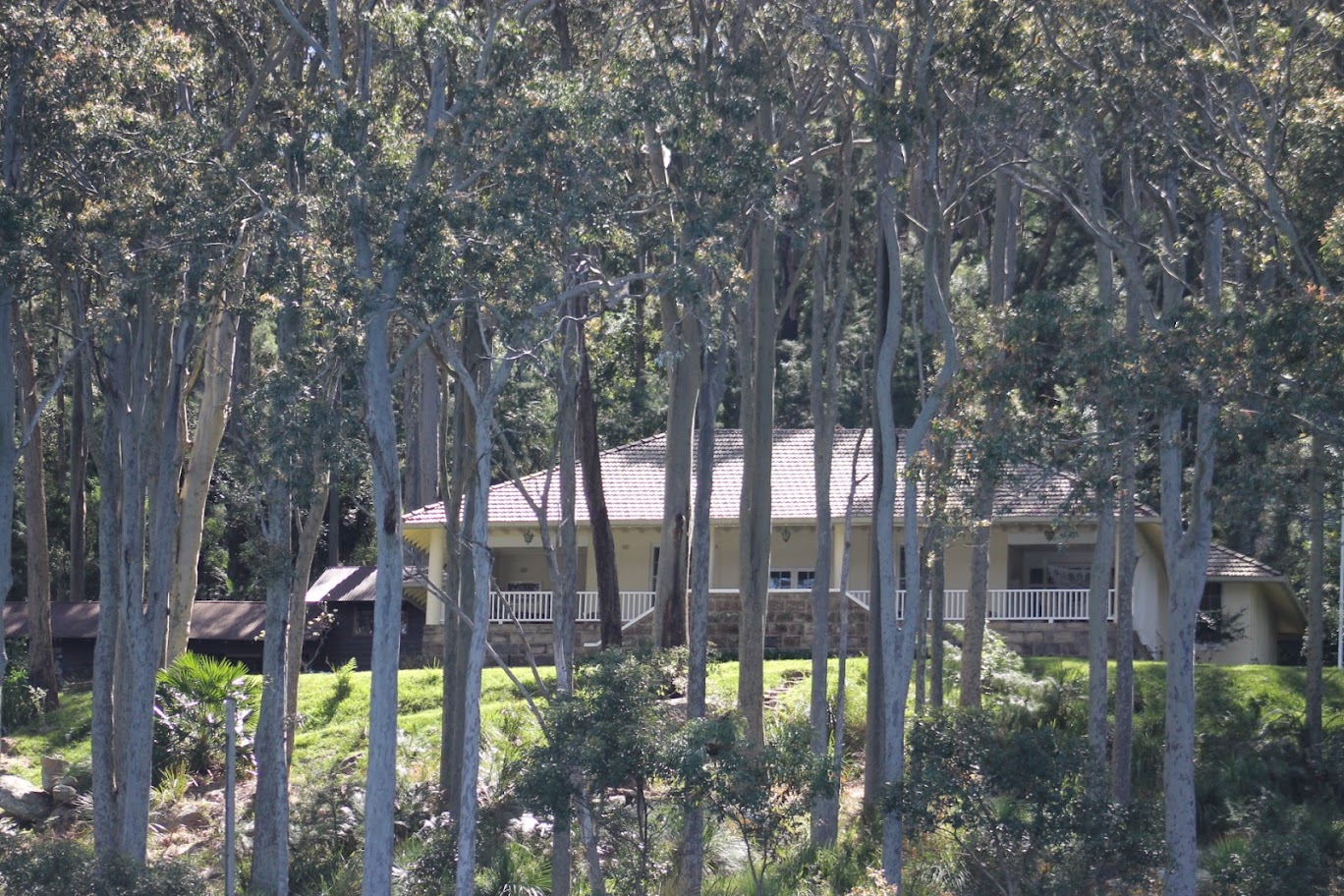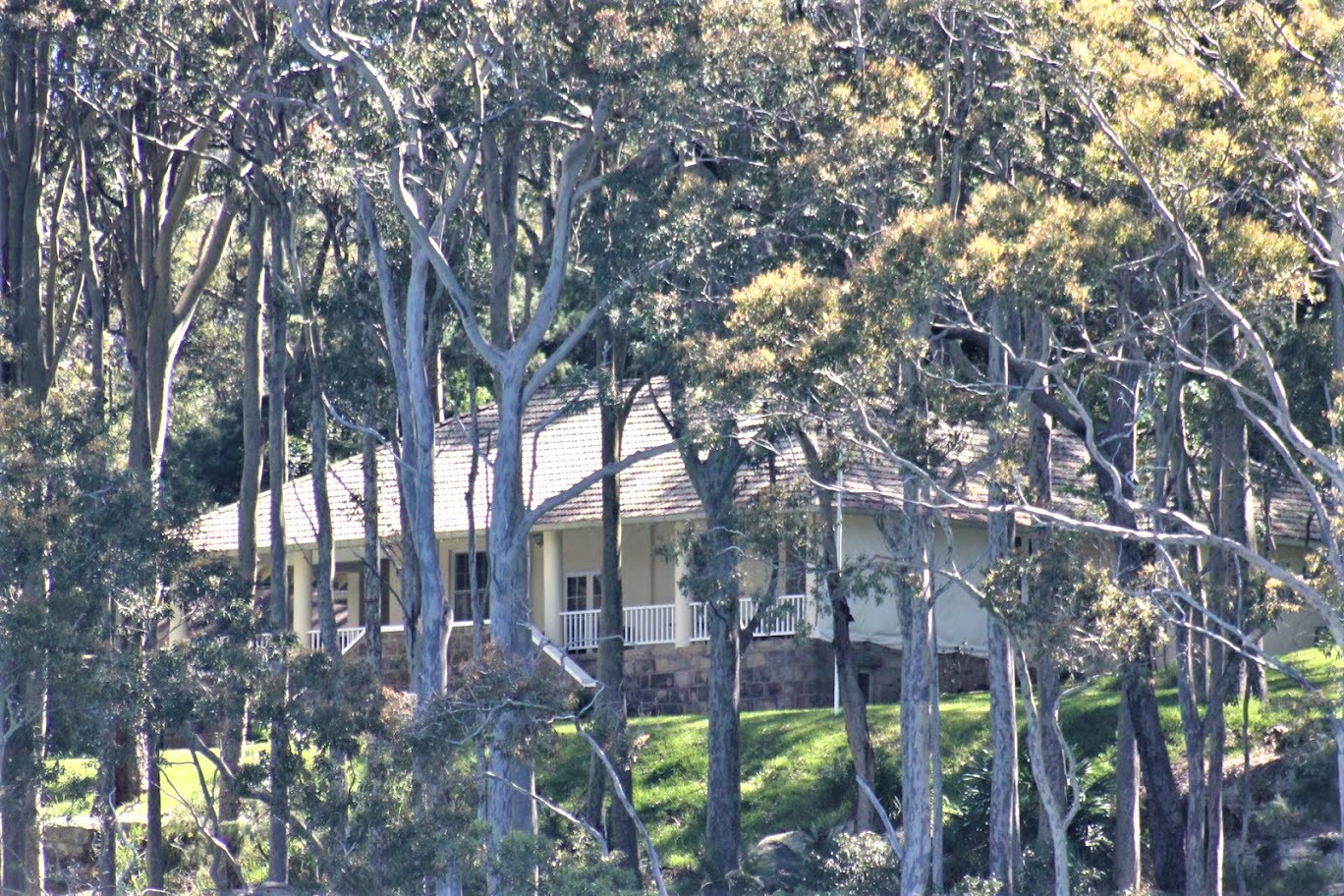May 15 - 21, 2022: Issue 538
Dorothea Mackellar Of Lovett Bay - The Poet From Whom The Electorate Received Its Name

Dorothea Mackellar, writer, 1927 - photographer May Moore. Purchased from May Moore, February 1928. Image courtesy Mitchell Library, State Library of New South Wales
As we head into the final week of the Federal Election of 2022, and voting day this coming Saturday May 21st, as well as our usual practice to remind youngsters that the annual Dorothea Mackellar Poetry Competition is on again this year, with a closing date of June 30th (visit: https://dorothea.com.au/), a few glimmers into her life and her time here at her home at Lovett Bay is one means of celebrating her legacy.
Mackellar only came to be a division in the year prior to the 1949 election:
Mackellar 'Approved'
CANBERRA, Mon. — Members of the Federal Parliamentary Labor Party said today that Caucus had approved the; name Mackellar for the electorate in which the Warringah Shire lies. They added that protests to the Prime Minister (Mr. Chifley) would not alter the decision. Liberal and Labor supporters at a meeting in Manly Council Chambers last Friday night decided to send a deputation to ask Mr. Chifley to help prevent the change of name. The Electoral Commissioners who redistributed the Federal seats recommended that the "old seat, in which the shire lies, retain the name Warringah.
Caucus Approval
They suggested the name Rawson for the new seat which includes the area from Cammeray to Balgowlah. Caucus approved the new electorates, but recommended changes in their names. One of the changes was to drop the name Rawson for the new seat, and call it Warringah, naming the balance of the old Warringah electorate Mackellar, in honor of the Australian poet, Dorothea Mackellar. The Minister for the Interior (Mr. Johnson) has given notice in the House of Representatives of a motion to adopt the Electoral Commissioners' report with the name changes proposed by Caucus. HT' Editorial, P. 8. Mackellar 'Approved' (1948, November 23). The Daily Telegraph (Sydney, NSW : 1931 - 1954), p. 13. Retrieved from http://nla.gov.au/nla.news-article248347871
Dorothea was the third child of four, and only daughter of physician and parliamentarian Sir Charles Mackellar and his wife Marion Mackellar (née Buckland), the daughter of Thomas Buckland. Born in the family home Dunara at Point Piper, Sydney, Australia on July 1st, 1885. Educated at home, travelling extensively with her parents and becoming fluent in French, Spanish, German and Italian, and also attended some lectures at the University of Sydney, her childhood and youth was a protected and highly civilised existence. Dorothea moved easily between the society of Sydney's intellectual and administrative elite, life on her family's country properties, and among their friends in London.
Her father Charles Kinnaird Mackellar (1844-1926) had been persuaded by then attorney-general W. B. Dalley, a private patient who had homes at Manly and Bilgola, to resign from his official appointments in August 1885 and was nominated to the Legislative Council to promote the public health legislation he had helped to draft, but which lapsed with the resignation of the Stuart government in October.
In July 1882 Dr. Mackellar had become government medical adviser, health officer for Port Jackson, chairman of the Immigration Board, and an official visitor to the hospitals for the insane at Gladesville and Parramatta. He was also ex officio emigration officer for Port Jackson, and a member of the Board of Pharmacy and the Medical Board. In July next year he campaigned for a federal quarantine system and was appointed president of the Board of Health in August. Contemporaries believed that Mackellar was solely responsible for the organisation of the department but he deferred to Roberts: 'it is rather … that I doggedly and persistently followed his lines than that I formulated any original scheme of my own'—the Mackellar motto was Perseverando. In 1882-85 Mackellar had been a member of the State Children Relief Board. He introduced the Dairies Supervision Act of 1886 which helped to reduce infant mortality. In 1902-14 he was president of the State Children Relief Board, and was identified with the Neglected Children and Juvenile Offenders Act (1905), which created children's courts and the probationary system. He was soon at loggerheads with his under-secretary Peter Board, mostly over the extension of the board's activities into areas not envisaged by its Act. Criticism, muted while Mackellar remained in office, became public not long after his departure.
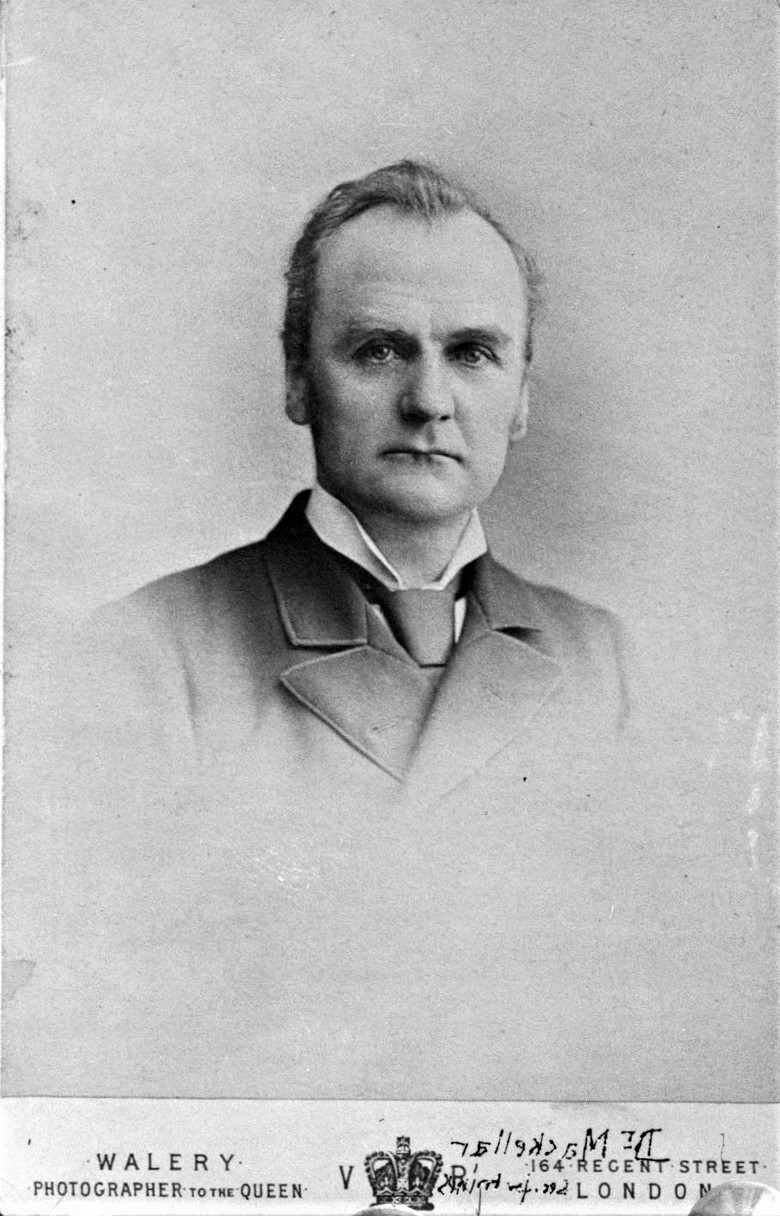
Government Printing Office d1_08569 Dr Mackellar, 1900. Photo courtesy State Library of New South Wales and NSW Records & Archives.
Until at least 1912, Mackellar had been convinced that environmental factors determined the development of the young. Enquiries abroad leading to his report as royal commissioner on the Treatment of Neglected and Delinquent Children in Great Britain, Europe, and America (1913) caused him to modify his views. With Professor D. A. Welsh, he published an essay, Mental Deficiency (1917), advocating better training and care of the feeble-minded. Mackellar consistently lectured and published pamphlets to propagate social reform.
Dr. Mackellar was admired for his reluctance to align himself with any political faction, and for his unselfish devotion to the public interest. He was Knighted in 1912, and appointed K.C.M.G. in 1916. Except for October-November 1903, when he was appointed to the Commonwealth Senate, he remained in the council until 1925 and an ordinary member of the Board of Health until 1925. [1.]
All this Dorothea was a witness to while growing up and it certainly guided her own interests and conduct throughout her life.
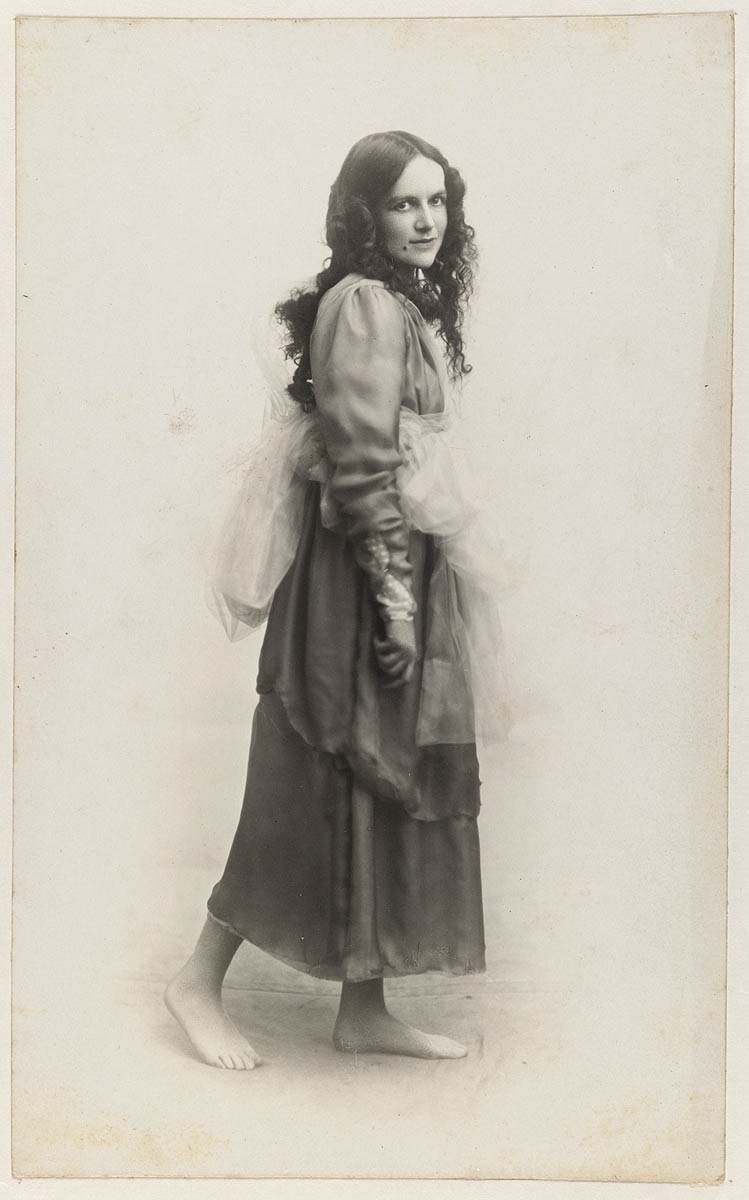
Dorothea Mackellar dressed as one of the Graces for Mrs T.H. Kelly's Italian Red Cross Day tableaux at the Palace Theatre, June 20th 1918 / photographer, Glen Broughton. Courtesy State Library of New South Wales.
HISTORIC TABLEAUX.
Sixty-eight ladles will take part in the tableaux at the Palace Theatre on June 20, which are being arranged by Mrs. T. H. Kelly In connection with the Italian Red Cross Day. Some most Impressive and beautiful subjects have been chosen. ... Then there will be be a group by Botticelli, in which Miss Dorothea Mackellar will prominently figure, also a portrait head by Botticelli ...HISTORIC TABLEAUX. (1918, May 21). The Sydney Morning Herald (NSW : 1842 - 1954), p. 6. Retrieved from http://nla.gov.au/nla.news-article15768443
Dorothea began writing while quite young and surprised her family when magazines not only published but paid for her verses and prose pieces. On September 5th 1908 a poem, 'Core of My Heart', which she had written about 1904, appeared in the London Spectator. It reappeared several times in Australia before being included as 'My Country' in her first book, The Closed Door, and Other Verses (Melbourne, 1911). She published The Witch-Maid, and Other Verses in 1914 and two more volumes of verse (1923 and 1926), also a novel, Outlaw's Luck (London, 1913), set in Argentina. With Ruth Bedford, a childhood and lifelong friend, she wrote two other novels The Little Blue Devil (1912) and Two's Company (1914).
During World War I and as a result of its frequent inclusion in anthologies, 'My Country' became one of the best-known Australian poems, appealing to the sense of patriotism fostered by the war and post-war nationalism. There is also evidence that Dorothea did more than support and champion those that served:
MAKE FRANCE KNOWN.
AN APPEAL TO AUSTRALIA.
The following was written by a French nurse (a girl of 20) to a schoolmistress in Sydney, who is a compatriot, and who made the acquaintance of the writer of the letter on a visit to France. We are indebted to Miss Dorothea Mackellar for the following translation:
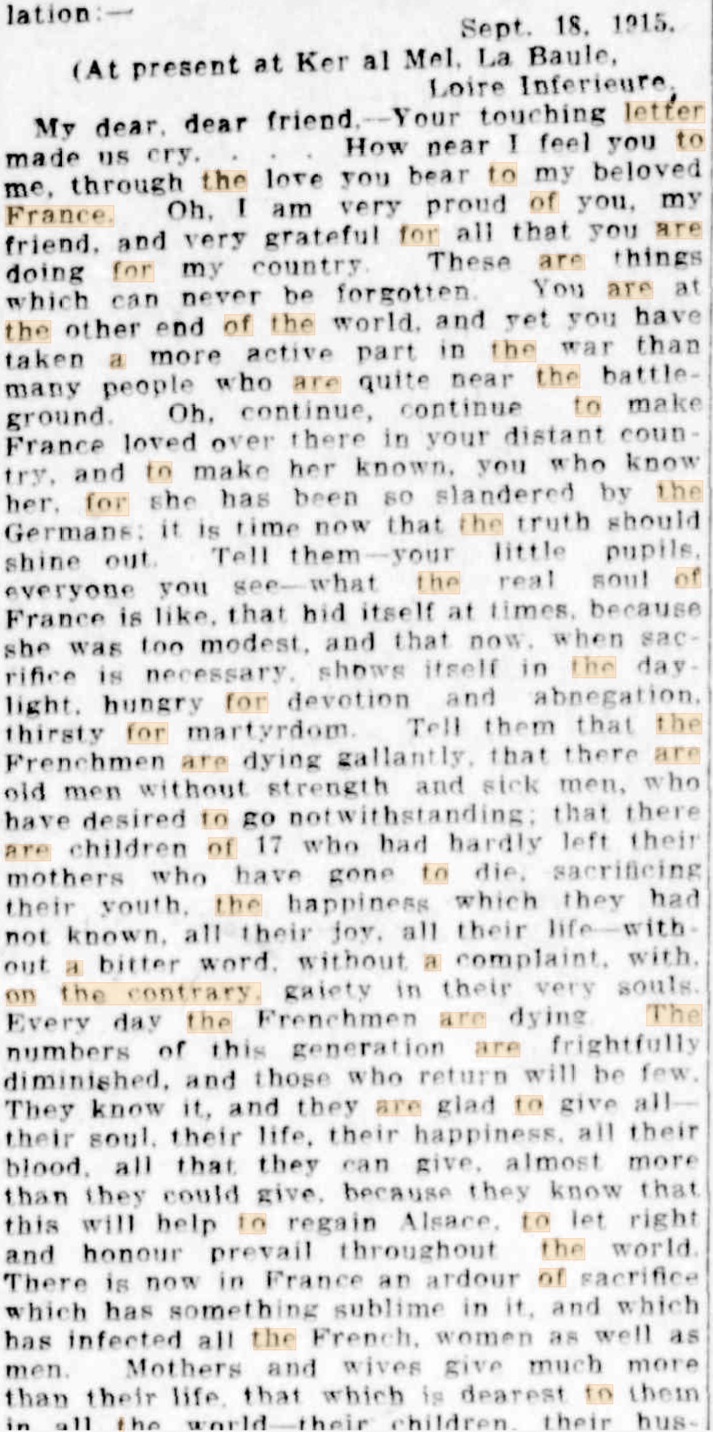
.jpg?timestamp=1652394105231)
In full at - MAKE FRANCE KNOWN. (1915, December 6). The Sydney Morning Herald (NSW : 1842 - 1954), p. 7. Retrieved from http://nla.gov.au/nla.news-article15629382
Dorothea in her twenties was the epitome of the Australian girl; pretty, sensitive, and fashionable. She was known as a strong swimmer, a keen judge of horses and dogs. Her verse shows that she was cultivated, spirited, and a lover of the Australian landscape and all its wildlife - in her novels that she was hopelessly romantic.
Between 1911 and 1914 she was twice engaged. The first engagement she broke because the man was over-protective; the second lapsed through misunderstanding and lack of communication after the outbreak of war. Some state Patrick Reginald Chalmers (27 June 1872 – 12 September 1942) Irish poet and writer, who worked as a banker was the second 'engagement' that lapsed just before WWI through a lost letter sent to him on her return to Australia, stating her parents approved of the marriage and he becoming married to someone else - however, in a time when telegrams also existed - why would that not also be sent? Chalmers first book was Green Days and Blue Days (1912), followed by A Peck of Malt (1915).
While Dorothea:
AN AUSTRALIAN IN LONDON.
MISS DOROTHEA MACKELLA
The other day a man asked me if I had seen Dorothea Mackellar's latest poem, and he named the journal it appeared in. I had not seen it, but I wanted to, and I soon got a copy of it. Personally, I have a very high opinion of Miss Mackellar's power as a writer and a poet, and, as I said long ago, I believe she has God's great gift of expression, and will find her way to the very soul of the race by the power of her pen.
This poem was written in London in the month of September last, and you can see the streets and the lights of the world's mighty metropolis through the 'gauzy curtains of pearl and pigeon blue.' You can see the 'anxious faces looking very strained and white' and you seem to realise London, somehow.
Then you have the yearning contrast of Australia ('where my heart is') when the shearing is over and the spring has begun. It is an exquisite poem and will help on the good work for Australia that Dorothea Mackellar has done and Is doing. Listen to the poem :
SEPTEMBER.
The morns are growing misty, the
nights are turning cold,
The linden leaves are falling, like a
shower of gold,
And over where my heart is, beneath
the Southern Sun,
The shearing's nearly over, and the
Spring's begun.
The crying flocks are driven to feed in
peace again,
They stream and spread and scatter
over the smooth green plain ;
And in the sky above them, the soft
spring breezes keep
A flock of clouds as snowy as the new
shorn sheep.
Now later comes the sunshine, and
sooner comes the dark,
The barefoot newsboys shiver; the
ladies in the park
Wear furs about their shoulders, or
Autumn winds are keen,
And rusty curling edges fleck the chest
nuts green.
The mists hang gauzy curtains of pearl
and pigeon-blue
Between us and the distance; the
street-lamps shining through
Wear each a golden halo, diaphanous
and fair,
But not one whit more lovely than my
own clear air.
More clear than you can dream it;
as bright as diamond
It bathes the plains and ridges, and the
hills beyond ;
It bathes the pillarded woodlands, that
ring with bell-bird notes,
With mating calls and answers from a
thousand throats.
The lamps are lit in London, and in
their searching light
The smiling anxious faces look strained
and white.
And over where my heart is, twelve
thousand miles away.
The dewy grass is glinting at the break
of day.
D— M—.
London, September, 1912.
AN AUSTRALIAN IN LONDON. (1913, February 25). The Sydney Stock and Station Journal (NSW : 1896 - 1924), p. 3. Retrieved from http://nla.gov.au/nla.news-article124131430
Although it is claimed Dorothea was unable to write much thereafter due to her disappointment in love except in succinct and accurate translations from little-known Spanish and German poets, there is material of hers available that speaks of love relinquishes or never realised, and poems and talks from her pen do appear long after 1911 to 1914. These two from late 1924 make one wonder who that first engagement was to, or was there another, as clearly someone she loved has passed at this season who isn't the Irish poet:
AN OLD SONG.
The almond blossom is overpast, the apple blossoms blow.
I never loved but one man, and I never told him so.
My flowers will never come to fruit, but I have kept my pride,
A little, cold, and lonely thing, and I have naught beside.
The spring wind caught my flowering dreams,
they lightly blew away —
I never had but one true love, and he died yesterday.
DOROTHEA MACKELLAR.
AN OLD SONG. (1924, November 15). The Register (Adelaide, SA : 1901 - 1929), p. 5. Retrieved from http://nla.gov.au/nla.news-article64051476
AN IDLER.
There's many a sadder epitaph
Than "She was ready to thrill or laugh,
For she kept the windows of her soul
Open to every wind of mirth
And splendour that blows around the earth.
Little she did, but here and there
Of love she took and gave her share,
And she kept her friendships, in good repair.
* ** *** ****
"Was she not lucky, on the whole?
— Dorothea Mackellar, in The Australian Woman's Mirror.
AN IDLER. (1924, December 16). The Register (Adelaide, SA : 1901 - 1929), p. 4. Retrieved from http://nla.gov.au/nla.news-article64054396
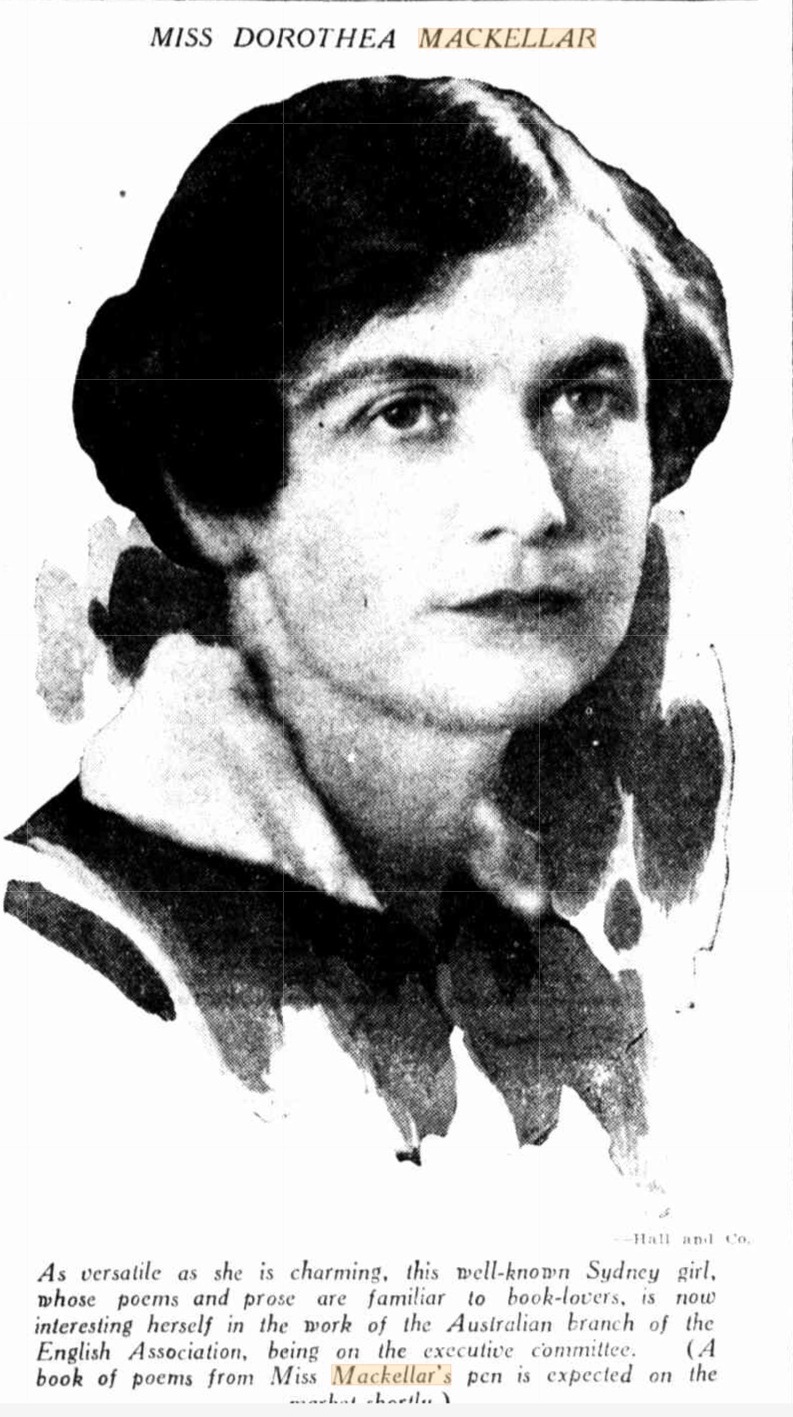
MISS DOROTHEA MACKELLAR (1923, October 28). The Sun (Sydney, NSW : 1910 - 1954), p. 2 (Women's Supplement). Retrieved from http://nla.gov.au/nla.news-article222680206
A Bush Retreat At Lovett Bay
Her later home was Cintra at Darling Point (built in 1882 by John Mackintosh for his son James), and in 1925, she commissioned a ''Summer cottage'', in reality a substantial home with colonnaded verandah overlooking Pittwater, "Tarrangaua" at Lovett Bay, an isolated location on the Pittwater estuary reachable only by boat.
In Dorothea Mackellar at Pittwater by Keith Amos, 2020, Mr. Amos states;
Almost certainly, Dorothea chose her land at Lovett Bay because she knew the occupant of the adjoining land. This was Dr. Donald Fraser, a psychotherapist whose home and practice overlooked Hyde Park, Sydney, at 34 College Street. Dorothea might well have met him through her father, whose practice and apartment (where she finished writing ‘Core of My Heart’) was in nearby Liverpool Street, also facing the Park.
Dorothea bought three vacant blocks at Lovett Bay to make one large site – one block over 3 acres from Henry Pickering on June 12th 1925, and two totalling over 6 acres from Fanny Pickering on July 28th, 1925. A bush block of almost 10 acres with over 250 yards of waterfront, at a total cost of £3,590 became hers, and, it would seem, the inspiration for a number of poems from then on.
The NSW Historical Land Records Viewer (HRLV) provides:
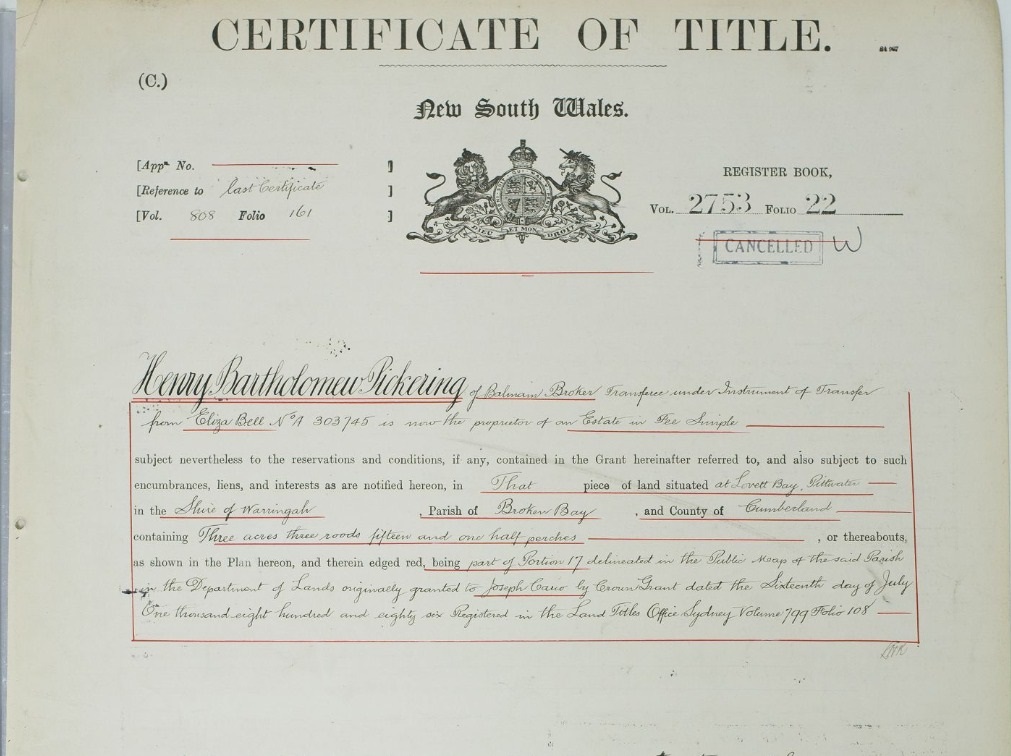
.jpg?timestamp=1652375376611)
.jpg?timestamp=1652375468675)
.jpg?timestamp=1652375494581)
.jpg?timestamp=1652375517069)
.jpg?timestamp=1652375572194)
.jpg?timestamp=1652375602335)
Most sources state Dorothea Mackellar commissioned well known architect, W. (William)Hardy Wilson to design a private bushland home for her at Lovett Bay on Sydney's Pittwater. Dr Joseph Davis B.A. (Hons), Dip. Ed., Ph.D, University of Wollongong, in a paper that features many of our own images and articles, states he does not believe this to be the case. Nevertheless, it is certainly his offices which did the work, which may have been based on Wilson ideas, Dr. Davis states the colonnaded verandah of this Lovett Bay retreat were certainly a Wilson preference for homes.
.jpg?timestamp=1652381574469)
Tipped-in collotype from Hardy Wilson's 'Old Colonial Architecture in New South Wales and Tasmania' 1924
Hardy Wilson's pencil sketch of the colonial house, Horsley, built for Lieutenant George Weston, and which provided the source for Hardy Wilson's celebrated design named 'Eryldene', at Gordon, completed in 1914 for the linguist and camellia expert, Mr. Eben Gowrie Waterhouse, (1881-1977), resembles what became Dorothea's Lovett Bay home. Mr. Wilson also had an Art Teacher in Sydney Long, a known habitué of our area. William Hardy Wilson was an Australian architect, artist and author. Determined to make Australians as aware of their early colonial heritage, Wilson made drawings of colonial buildings in New South Wales and Tasmania: he 'looked at buildings with a painter's eye as much as an architect's', even noting the plants in their gardens. In 1924, his 'Old Colonial Architecture in New South Wales and Tasmania' was published containing 50 collotypes of his drawings. As a creative herself, it is likely they met at one art exhibition or another - and Dorothea's known defence of Artists may have added to Hardy Wilson overseeing the project, along with her clear love of Australian works.
The papers provide:
Builders desirous of tendering for large Stone Cottage at Lovett Bay, Pittwater, apply for quantities etc to WILSON, NEAVE, and BERRY, Union House, 247 George Street. Advertising (1925, September 9). The Sydney Morning Herald (NSW : 1842 - 1954), p. 3. Retrieved from http://nla.gov.au/nla.news-article16240697
TENDERS. Pittwater.—Erection of a large stone cottage at Lovett Bay, Pittwater. (Quantities) Messrs. Wilson, Neave, and Berry, Union House, George-street. TENDERS. (1925, September 16). The Sydney Morning Herald (NSW : 1842 - 1954), p. 10. Retrieved from http://nla.gov.au/nla.news-article16242512
What was built was a four-bedroom brick bungalow with tiled roof and stone foundations. Front and side verandahs surrounded a an airy central living and dining room with open fireplace and French doors. The kitchen, pantry and laundry were on the western side; bathroom, toilet and main bedroom on the eastern side. A long hallway linked these symmetrical wings. The rear courtyard had a sheltered northerly aspect; tanks collected roof water; sewerage drained to a septic tank (the only remaining plan). Specifics of the build are: the living room 36ft x 18ft, main bedroom 22ft x 11ft, side verandahs and sleep-out 12ft wide, front verandah 60ft x 10ft.
This advertisement from September 15, 1993 advertisement shows not much had changed in the original structure, although clearly some of the acreage had been sold:
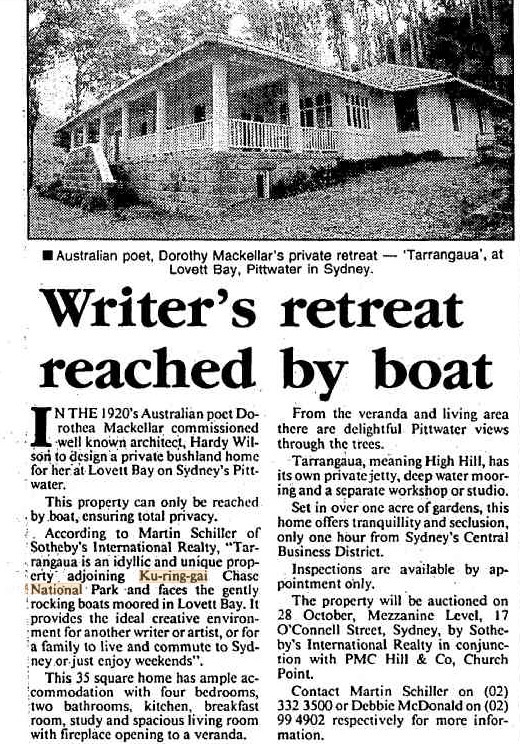
In Dorothea Mackellar at Pittwater by Keith Amos, 2020, Mr. Amos states;
The construction was challenging: 60,000 bricks, terracotta roofing tiles, tons of sandstone (quarried offsite) for the foundation and retaining walls, and a large amount of timber, were all landed at high tide and winched up to the site. Most materials were shipped from Sydney and unloaded at the bay from a barge. The timber boards and window sills were tallow wood, doors and cupboards Queensland maple, the ceiling and roof framing Douglas fir (oregon). Ceilings were fibro laid on the top of the joists, the walls double brick, verandah columns rendered brickwork. The tiles had a glazed Marseilles pattern first marketed in 1924. Taylor (the builder) probably had a big building team to complete the job as quickly as possible. The work most likely began before the end of 1925, continuing into 1926.
Anyone who has been to this home or gone past in their boat would know one of its most outstanding features is the wonderful grove of tall straight trees that surround it - something this poet loved. There are also verses penned by Dorothea around the finish of the build in mid 1926 which have clearly been inspired by this beautiful part of Pittwater - some examples - worth noting in these poems is that when she refers to an 'apple tree' she means our own angophoras:
PEACEFUL VOICES.
I fortunate, I knew a refuge
When the strained spirit tires
Of town's metallic symphony
Of wheels and horns and wires:
Where through the golden empty stillness
Cool flowing voices speak,
The alto of the waterfall,
The treble of the creek.
From far beyond the headland's shoulder,
South-easters bring to me
Reminder of earth's wandering,
The strong voice of the sea.
I happy, in a leafy fortress
Listen to hidden birds
And small waves of a hidden tide
Mingling their lovely words.
-DOROTHEA MACKELLAR. PEACEFUL VOICES. (1926, February 6). The Sydney Morning Herald (NSW : 1842 - 1954), p. 11. Retrieved from http://nla.gov.au/nla.news-article16265351
BARGAIN.
What do you think the Kindly Folk, the fairies, gave to me?
A bird-delighting fountain
And an almond-tree,
A trembling silver tinkle of creek, a little house of stone,
And a clean and leafy woodland
Wherein to walk alone.
What was the price the Good Folk asked?
Never their gifts are sold.
I would not chaffer with them
For the fairy gold.
I freely gave a promise instead, that pleased the fairies well,
But what It was, for Paradise,
Orchid-valleys, and trees of spice
l will not tell.
DOROTHEA MACKELLAR. FOR THE CHILDRENS. BARGAIN. (1926, May 15). The Sydney Morning Herald (NSW : 1842 - 1954), p. 11. Retrieved from http://nla.gov.au/nla.news-article16292243
TESTS.
If when I'm dying, Karen, you wish to know
(Death being indifferent slow) how far away
my spirit has withdrawn, , '
whisper to me of dawn
over the sandhills; say
'The surf is good to-day;'
(Green hollow glassy waves rushing upon the beach)
If stir not nor smile, know that I'm out of reach.
Though when I'm dying I've made no sign at all
It I'm within your call I yet shall wait
one Instant If you speak,
lips to the greying cheek,
of flying hooves In spate
thundering down the straight;
or If you burn for me myall and apple-tree
and see me take no heed-I shall be far indeed
DOROTHEA MACKELLAR. TESTS. (1926, June 12). The Sydney Morning Herald (NSW : 1842 - 1954), p. 11. Retrieved from http://nla.gov.au/nla.news-article16298425
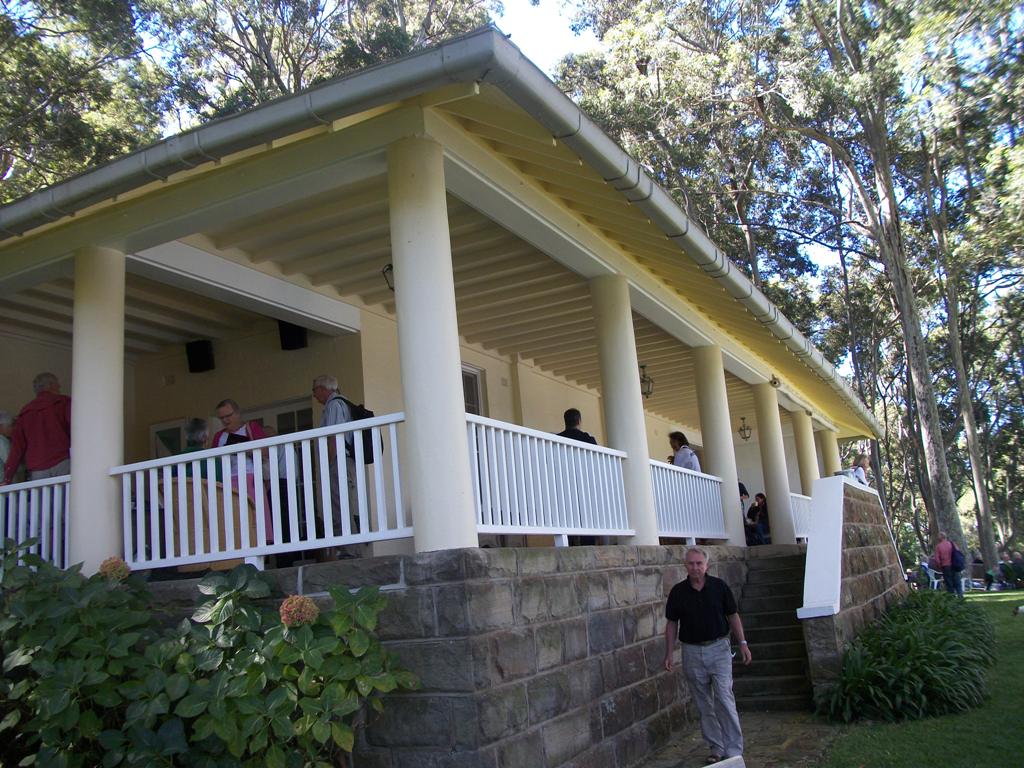
ASKING THE IMPOSSIBLE.
People are so unjust to Australian trees. Even the I-haven't-seen-any-other-country-and-don't-want-to, Australia's-good-enough-for-me type (which, though dull, is less irritating than the snob), is apt to say that Australian foliage is monotonous. So are clouds, If you do not observe their shapes and colours. We can find what we want of either, If only we know where and how to look, but It is no use to ask the scented showers of this peppermint gum for dense shade, or the Moreton Bay fig for feathery plumes. Yet that, in effect, is happening constantly. Generally It is monotony of colour of which people complain, the "uniform bronze-green" (or "blue-green" or "grey" the colour sense of the complainants is apparently weak). They never notice the enchanting bright green of the apple trees (angophora), or the green beryl colour of the flame-tree leaves, and there are plenty of the latter about, even if apple trees are scarce in town. But most likely they are among those who think that some trees are foreign because they lose their leaves. A natural mistake,, but why some should suppose the blueberry ash is an exotic I cannot imagine, unless it Is that some of Its leaves turn a splendid orange-crimson, just when the berries, like polished lapis lazuli, are clustered thickest. But the leptospermum has been called a stranger, too, and It has no autumn colouring, only its strong leaves, lettuce-green when they break from the bud, and like Indian jade in their maturity, and Its profusion of lacy white stars. It is true that the stars fall as they fade, and make a soft brown praying-carpet under the boughs; trees have been murdered for less.
But of tree-killing; lawful execution or plain murder, I hope to speak later.
TREES. (1925, August 15). The Sydney Morning Herald (NSW : 1842 - 1954), p. 11. Retrieved from http://nla.gov.au/nla.news-article16235725
And 'later':
TREES.
AN OPPRESSED PEOPLE.
(By DOROTHEA MACKELLAR.)
Forests must be cut Into to make way for sheep and cattle and for crops. That Is true-though It is often forgotten that trees are themselves a crop, and a very valuable one. But granting the need, yet forests are vanishing the world over at a dangerous speed, and usually with every accompaniment of waste. The flocks and herds, the cultivated fields do not keep pace with this destruction; more-over. It seems that we shall soon have to find substitutes for timber in many of its thousand uses, since before many years have gone we shall surely run short of It. The world was once shaggy with woods, but now Western Europe is comparatively bare, and much of Asia Is stripped. Nowhere are the results of reckless felling more clearly seen than in Palestine, where great tracts of once fertile land is now desert. The trees which withstood the advancing sand having been cut down, there are now dunes instead of groves, and the rainfall has naturally diminished with the moisture that attracted it That never was a grass country.
North America Is rapidly being denuded of its huge forests, and planting merely retards the inevitable end. But I do not mean to say much about the tons of millions of feet of timber that are consumed every year faster than nature can replace them. The average man Is hypnotised by the word "millions." He may repeat figures with unction, but as soon as they pass the thousand-line he ceases to think It necessary to have any practical dealings with them, and the average woman is even more indifferent. Millions to her mean nothing but a pleasant sum, a synonym for "very many." She never takes them seriously.
AUSTRALIA'S WASTE.
So leaving figures aside, let us consider Australia, never one of the world's great timber countries, and now, in every State but Queensland, one of the poorest. She has squandered and Is squandering such resources as she has; some of the finer trees are practically extinct already, and many others are becoming far too rare. Much of the loss is due to wasteful methods of clearing; it is a pity to let thousands of tons of good timber lot on the ground or go up in smoke, but when homes are being carved out of the bush there is seldom time or moans to consider such details. Forestry is at this date endeavouring to right the balance; a difficult business, for forestry is not, as many seem to suppose, a mere matter of sticking rows of baby trees in the ground and waiting for them to grow up. Some trees are very strange and shy in their behaviour, and It is feared that once they are killed out of their wild haunts they will not return again for all our coaxing.
But the most unfortunate aspect or the question is that the pioneer way of regarding trees as obstructions which must be removed before homes can be built, persists in nearly all of us, though we may be town dwellers by birth and breeding. We seem set on exterminating our trees on any excuse or none. No sooner has an avenue grown to magnificence titan the word is given to hack1« down, and the average Australian, on acquiring a timbered site for his home, will before building have every tree rooted out, and then plant a few-usually the least suitable for that situation-when the house is completed.
The suburb in which I live still possesses some stately trees. But long ago, passing one of the old gardens, I saw that it had been subdivided for sale, and mourned in my heart over the Impending fate of a splendid Port Jackson fig that stood by the low stone wall
It was such a beautiful thing In Its perfect, rhythmical shape and sober richness of colour utterly satisfying, like a completed phrase of music. But as the weeks went I found I had been too hasty. Behind the great tree a dignified little house was rising; Its architect and owner fully appreciated the fig tree's beauty and that or the flowering fruit trees near It. for they loft them quite untouched. Now the house Is completed, and the tree at Its gate bestows on It a richness, a mellow charm that not even Its architectural purity could have given It In less than a century of treelessness. Not many new houses are blessed with such loveliness us that particular tree ready at their gates, but nevertheless the odds were ten to one against even that exceptional beauty being preserved.
IN THE WAY.
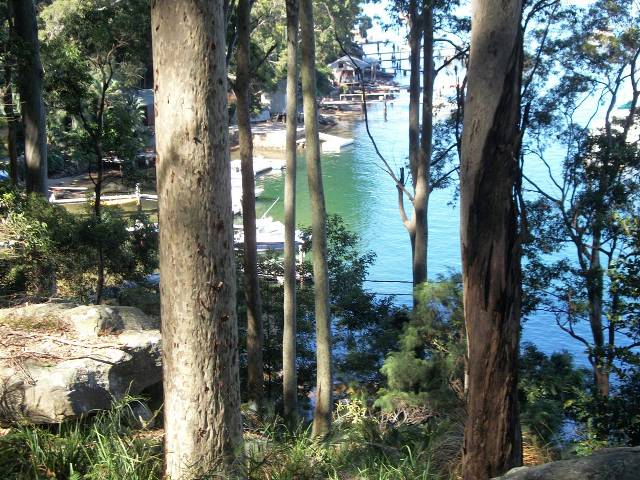 Those who destroy trees give many reasons for their action, the most usual being that they are "In the Way." The way of what? "If It weren't for the trees we'd get the whole view of Manly." Yes-and all the dust and wind and glare as well. I mean no disrespect to Manly or any other distant prospect, but most views are Improved by the neighbourhood of a tree or so, if only as a contrast. Nor do I necessarily object to wind and glare, but there will always be plenty of places where one can enjoy these things, even If we allow trees to screen our houses from them. The second reason given Is that trees are "dirty." Should you ask why, you are told that it Is because "they're always dropping their leaves about." This Is, I believe, a purely Australian notion. In other countries people seem quite resigned to the natural law by which trees lose their leaves as the new ones bud, and a camphor laurel, for example, is no more considered "dirty" for obeying It than a rose because she withers. The third reason is that they are damp, or dark A large Moreton Bay fig tree entirely blocking the windows of a 'house would no doubt be both. But in this climate it is hard for most trees to make a house really damp unless It has something wrong with it from the beginning, and some mitigation of summer's glare is an excellent thing, if eucalypts, acacias, or deciduous trees are planted or discreetly left, they will cause neither damp nor darkness. Trees are so often planted in gardens or streets without any regard for their habit of growth. In the course of years they make too dense a shade or their roots develop In-conveniently, and they have to be destroyed. It Is not the trees' fault that they were planted in the wrong place, but they are blamed for It.
Those who destroy trees give many reasons for their action, the most usual being that they are "In the Way." The way of what? "If It weren't for the trees we'd get the whole view of Manly." Yes-and all the dust and wind and glare as well. I mean no disrespect to Manly or any other distant prospect, but most views are Improved by the neighbourhood of a tree or so, if only as a contrast. Nor do I necessarily object to wind and glare, but there will always be plenty of places where one can enjoy these things, even If we allow trees to screen our houses from them. The second reason given Is that trees are "dirty." Should you ask why, you are told that it Is because "they're always dropping their leaves about." This Is, I believe, a purely Australian notion. In other countries people seem quite resigned to the natural law by which trees lose their leaves as the new ones bud, and a camphor laurel, for example, is no more considered "dirty" for obeying It than a rose because she withers. The third reason is that they are damp, or dark A large Moreton Bay fig tree entirely blocking the windows of a 'house would no doubt be both. But in this climate it is hard for most trees to make a house really damp unless It has something wrong with it from the beginning, and some mitigation of summer's glare is an excellent thing, if eucalypts, acacias, or deciduous trees are planted or discreetly left, they will cause neither damp nor darkness. Trees are so often planted in gardens or streets without any regard for their habit of growth. In the course of years they make too dense a shade or their roots develop In-conveniently, and they have to be destroyed. It Is not the trees' fault that they were planted in the wrong place, but they are blamed for It.
The fourth reason for tree-murder has more solidity; It Is that trees Interfere with flowers. They do; if you grow large trees in a small garden you will not have quite so many flowers as if It were bare of cool green shade, and If your garden is the size of a pocket handkerchief, and you possess even one splendid tree you will have to choose your flowers with care, not many kinds will flourish beneath It. But much as I love flowers I cannot see why they should be counted more precious than trees, and when professed flower-lovers tell me, as occasionally they do, that they do not care for trees at all, I am filled with the same uneasy sense of something missing, as when I hear that someone loves dogs, but only quite Bmo.11dogs, or birds-but only the kinds you can cage easily. It is rather as If they should say that they adored children-but only yellow-haired female children from 3 to 6years old, and well-behaved ones at that. Personally, I am not entirely in sympathy with the cries of Joy that go up whenever trees are cut down in Sydney streets, and flowerbeds laid out in their stead. Doubtless It was desirable to widen Macquarie Street, and the flowerbeds that replaced the trees there are gay as fresh paint, but with those great gnarled trunks departed much of the character and dignity of the street. Perhaps it Is partly because trees take so long to grow that they have such character and weight. A flowerbed can be destroyed, and built up again in a year or two at most, but you cannot trifle with trees.
OLD TREES.
A street up which I often walk-a steep, rather narrow, very Sydney-ish street-has been widened once already, when the row of fig trees, that used to stand outside a fence, were left on the outer edge of the pavement by humane councillors who appreciated cool shade in summer, and the picturesque at all times. They are old trees, massive, sculptured, dignified. Admittedly their roots have cracked the asphalt in several places, they take up some room, so that It would be impossible to walk six abreast up the path when they grow. But people do not wish to walk six abreast up that street, nor ever will so far as one can see; it has not the natural features which would easily turn it into a George or Pitt street. Meanwhile the trees provide blessed shade on an exceedingly hot hill, besides giving It character and repose. Long may they survive! The largest and loveliest Jacaranda I ever saw was cut down by its possessor, a lady who prided herself on her sense of natural beauty, because of its dirtiness, that is, because ' for weeks at a time the drifted blossoms used to make the ground beneath It look as It they had fallen there. But that was in another State. I know a silver poplar, in yet another State, which in autumn is a golden torch among the darker trees, seen miles away on the mountain where it grows, and continually its light gold drifts down till underneath it there is a carpet more glorious than ever Sultan trod. The woman who has most to do with that tree refuses to have the gold swept up (saying, very sensibly, that It Is the most beautiful think in the garden), to the despair of her gardener, who has Several times been on the verge of giving notice about It. To do him Justice, he has never thought of killing the poplar for its bad habit, and luckily autumn soon turns to winter In those hills, for, as he says, "It do look so untidy and unnatural, leaves bein' left." Those who feel Joyce Kilmer's reverence are in the minority; Poems are made by fools like me, But only God could make a tree. The majority seem bent on unmaking trees as fast as they can.
DOROTHEA MACKELLAR. TREES. (1925, August 22). The Sydney Morning Herald (NSW : 1842 - 1954), p. 11. Retrieved from http://nla.gov.au/nla.news-article16237193 - Photo in text: view from Tarrangaua over Lovett Bay. A J Guesdon photo.
Dorothea's father passed away at his residence, Rosemont, Woollahra, on July 14th 1926 and was buried in the Anglican section of Waverley cemetery. His estate, valued for probate at £39,205, was left in trust to his wife and upon her death on March 31st 1933, she left £45,890 to their surviving children Eric, Malcolm and Dorothea. Their eldest son Keith Kinnaird was killed in South Africa when serving with the 7th Dragoon Guards in the Boer War, in 1900.
Supporting All Other Women
In the late 1920s, when Dorothea was now in her 40's, she, Thea Proctor and Ruth Bedford were instrumental in forming the Zonta club of Sydney. The following mention below on a women's page in The Sun, had been preceded with a longer piece in a Grafton newspaper about women, and mens, usefulness after the age of 40. Biographers state that it was in the late 1920s' that Dorothea's health began to deteriorate, although she would remain active for decades yet and she became more focused on womens' issues. These articles also came before and after the October 24th 1929 'Great Crash' on Wall Street that would plunge even Australia into a recession unlike it had seen since 1893.
With the triumphant opening of the Forum Club, I really did think the Women's Club movement had reached stationary point for a year or so, at least. But no. I've just heard of another most intriguing "get together" effort — by name the Zonta Club (an Indian word meaning "square some"). As yet my particulars are a trifle sketchy, but it sounds as if it might be a feministic version of the Rotary Club.
So far each member represents a profession and at the periodical conversaziones is called on in turn to give a short address. The only two names I've been able to discover are Dorothea Mackellar (poetry), Thea Proctor (art). There is a woman doctor, of course, and later the circle will be extended to include several branches of medical work and women from every possible profession. Interesting folk all and membership should be coveted. Susan Says... (1930, September 21). The Sun (Sydney, NSW : 1910 - 1954), p. 22. Retrieved from http://nla.gov.au/nla.news-article224236662
AGE AND USEFULNESS
A novel institution with the striking name of "The Zonta Club" has been formed in Boston, U.S.A. Its object is "to explore a way through the apparent barrier of discrimination that confronts thousands of older, men and women in the United States seeking new employment." Having learned from questionnaires that practically all firms interviewed were disinclined to hire applicants more than 40 years old, the club, which is an organisation of business and professional women, is studying how to improve the situation.
Everyone is familiar with the phrase " too old at forty, " but, although there is a tendency in. these days to look for youth in parcelling out jobs of importance, it is surprising to learn that it has found such general acceptance in a progressive country like the United States as to cause the organisation of a counter movement. As a matter of fact the phrase is a fallacy. A man's usefulness does not depend on his years and there are hundreds of jobs in which the temerity and inexperience of youth are likely to prove a serious handicap; whereas the caution and experience that are gained from maturity -are an undoubted asset.
The whole question of a man's usefulness is bound up with so many factors that in. the long run age, as counted in actual years, plays a very small part indeed in its determination. Some young men mature early and their powers remain at full tide for a long period.. There is the historic case of William Pitt the Elder, Earl of Chatham, who began his great Parliamentary career when still so young, that he was twitted by Robert Walpole on his youth, and conducted the administration of England's affairs at a critical period with great vigour for many years. Another instance of extraordinary youthful capacity was that of his even more brilliant son, William Pitt the Younger, who entered Parliament at 21, became Chancellor of the. Exchequer at 23 and Premier at 24 and guided the destinies of England for 17 years through the trying period of the French Revolution and the subsequent Napoleanic war until he died in 1806 at the early age of 46. Chatham was forceful till his death at 70 years of age and had his son lived he might have retained his faculties over an equally lengthy period.
On the other hand we have; the case of Lord Beaconsfield (Benjamin Disraeli),who was 64 when he first become Prime Minister of England and whose greatest achievements and triumphs were gained when he was over seventy years of age. He was 71 when he made Britain half-owner in the Suez Canal, and at 74 he was at the zenith of his fame. Gladstone, Beaconsfield's contemporary and rival, was only 23 when he first entered Parliament, was associated with Her Majesty's Government as a Lord of .the Treasury at the age of 25 and attained Cabinet rank when only 34. Fifty years later he was still an active force in politics and Premier of England till the defeat of his second Home Rule Bill brought about his retirement, he being then 84 years of age! ''Had I died at threescore years -and ten," he said, "half my life's work would have remained undone."
There are cases of brilliant men who occupied a big place on the national stage, but they are nevertheless typical of what occurs in less important avenues of life. They prove that neither youth nor age is in itself a bar to rich and full service to the community, and they, along with a thousand others who might be mentioned, shatter the false notion that men pass the zenith of their power at what is commonly called middle life. Indeed, many famous men have given their finest evidences of genius long after this period and some have fathered epoch-making works at an age when the thoughtless would have classed. them as fit only to be relegated to oblivion.
Discussing this question in a chapter, "Not Too Old at Forty," in his virile and awakening book, " Forging Ahead'' Arthur O. Richardson says; "One of the war's lessons is that it is entirely wrong to judge the man of forty too old for valuable service. The war called back from retirement tens of thousands of the well-on-the-other-side-of-forty men, put them into harness again, and the big majority rendered a surprisingly good, account of themselves. .... The .man of determined spirit is never too old to fight the obstacles on the hill of difficulty. So long as you keep busy and active you will remain young-minded. No man is a failure until he is dead or until he quits the great game, which is very much the same thing.''
Richardson then goes on to quote some notable cases aren't the work of men whose names have become household words. He tells us that at 46 Louis Pasteur had a stroke which left one side completely paralysed. "It was," he said, "during the following 27 years, under this severe bodily handicap, .that lie worked out the -theories of bacterial infection and. .inoculation which have revolutionised medical and surgical, science. " Goethe finished his. masterpiece, "Faust," on the eve of his 85th birthday. John Milton started to write ''Paradise Lost '' when 47 and finished it ten years later, James. A\att lix.cd half a century before he was able to demonstrate the commercial value of his improved steam engine, Stephenson was nearing his 50th year. wlum the . Rocket'' won him enduring fame, Faraday reached middle age .before he turned his attention to electricity and Morse was 30 before he, became interested in similar work.
The list is one that could he extended until it became wearisome. The work of these men of genius, along with the greatest triumphs of Thomas Alva Edison, would have been lost to the world had they been satisfied to accept the theory "too old at forty" and been content to sit back and leave the world's work to others. What a waste of energy it would have been! That brings us back to the point which the Zonta CIub in Boston is seeking to drive home. Says Miss H. Adele Howe, 'chairman' of its service committee, "We hope to point a way through to employment for these people (the allegedly too old at forty), not' as a matter of philanthropy, but as a straight matter of business efficiency. It is a matter of trying to correct a tremendous econoic waste, for when men and women of experience, judgment and ability are left idle, society is losing valuable services they might perform if they were fitted into new fields of usefulness, or would fit themselves into those fields."
Fortunately; there is not this same tendency to accept the exploded "too old at forty" theory in Australia as in America, but there is a disposition on the part of many men, who feel they have, attained a measure of material success to sit back and leave the job of running the world to others. They may find it advisable for various reasons to get out of one avenue of usefulness, but there is always a sphere of service to the . community in which they can find a place somewhere if they are worth anything.at all. That is just the time when, with plenty of leisure, they should get into harness at some of the jobs the business man finds himself too occupied to handle. AGE AND USEFULNESS (1929, January 24). Daily Examiner (Grafton, NSW : 1915 - 1954), p. 4. Retrieved from http://nla.gov.au/nla.news-article195041057
Despite supposedly 'loathing all restrictions and meetings', Dorothea Mackellar was honorary treasurer of the Bush Book Club of New South Wales and active in the formation in 1931 of the Sydney P.E.N. Club as well as being active in other areas:
FAERY POETRY.
MISS MACKELLAR'S ADDRESS.
To be transported to far Celtic hills, where the rowan and the hawthorn blossom, and where the lowing of a cow, hidden behind a deep mist, mingles with the music ot Kevin's pipes, was the sensation experienced by all who listened to Miss Dorothea Mackellar's ad-dresses on Faery Poetry, at the Women's Country Club last night.
Faery, said Miss Mackellar, was the collective name for all those beings that are mentioned in literature, under the guise of different names, such as elves, goblins, brownies, trolls, sprites, and leprechauns. They were described differently, according to the theory of each poet; but they had found a place In the verse of all civilised countries. The faery beings that were met with In Chaucer's works were essentially similar to those of whom Shakespeare wrote. Keats had written "La Belle Dame Sans Merci," using the mysterious power of faery attraction for his theme, and even on in verse of such modern writers as Yeats and Walter de la Mare, one met once again with "the good people," who stole, not only souls, but humans themselves. It would be difficult to contemplate a national poetic literature, even In future years, that had In it no place for faery poetry.
Mrs. Campbell Carmichael presided, and a vote of thanks, proposed by Mrs. Fenton Spencer, was passed. FAERY POETRY. (1927, March 1). The Sydney Morning Herald (NSW : 1842 - 1954), p. 4. Retrieved from http://nla.gov.au/nla.news-article16358198
Miss Dorothea Mackellar has joined the Arts and Letters Committee that was formed this week as a new standing committee of the National Council of Women. NEAR AND FAR. (1930, March 20). The Sydney Morning Herald (NSW : 1842 - 1954), p. 5. Retrieved from http://nla.gov.au/nla.news-article16634958
LETTERS TO THE EDITOR - LAMBERT EXHIBITION.
TO THE EDITOR OF THE HERALD.
'Sir,-If the general public remembered that the Lambert exhibition, at present In the Education Department's gallery, will close on the 12th of this month, those people who have realised It would not be strolling from one masterly work to another in such un jostled comfort. This loan exhibition is of absorbing interest, containing, as it does, so much of Lambert's recent and best work, which has never been assembled before, and, since a great deal of it is from private collections, will never be seen in this way again. It is interesting, too, to contrast it with the excellent exhibition lately held in Horderns' art gallery. Here the exhibits are almost entirely different, and the effect of them is concentrated. The whole gives a deep impression of power, versatility, and an energy that is never slip-shod in its swiftness. It is no wonder that not one of these loan pictures is for sale.
I am, etc.,
DOROTHEA MACKELLAR. Pittwater, Dec. 6.
LETTERS TO THE EDITOR. (1930, December 10). The Sydney Morning Herald (NSW : 1842 - 1954), p. 8. Retrieved from http://nla.gov.au/nla.news-article16737363
POETESS IN HER SYDNEY GARDEN.
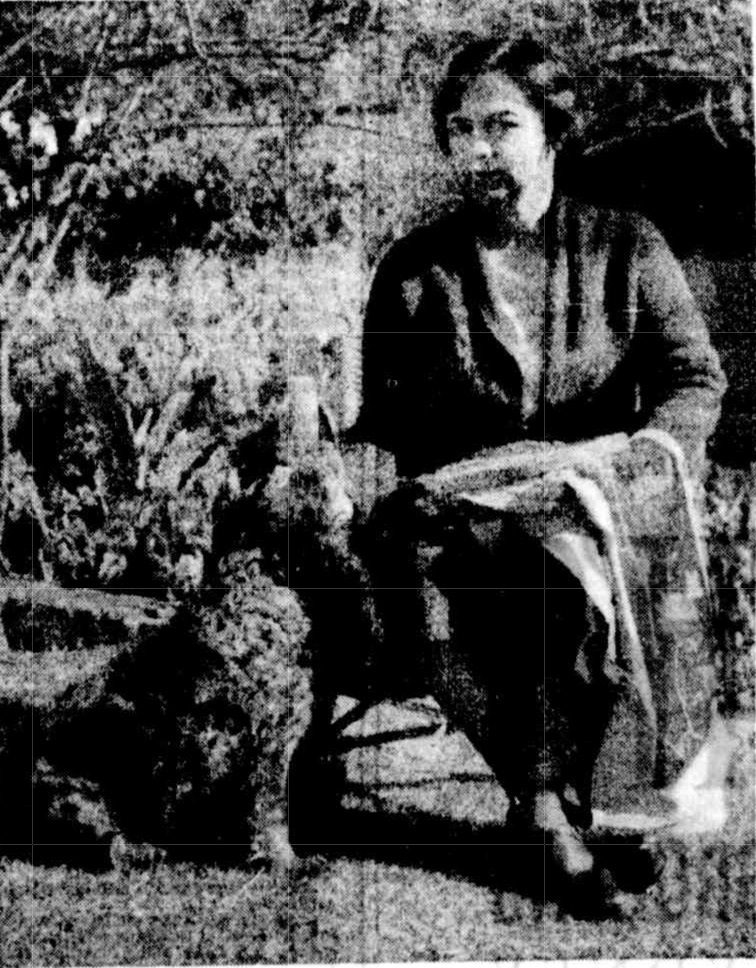
MISS DOROTHEA MACKELLAR, the well-known poetess, photographed in the garden of her home at Darling Point yesterday morning. In the afternoon she opened a private view of animal drawings by Mr. John Skeaping, at 17 Rowe-street. Miss Mackellar said that the artist's work reminded her of the prehistoric drawings in the Altamira Caves, in Spain. POETESS IN HER SYDNEY GARDEN. (1936, August 13). The Sydney Morning Herald (NSW : 1842 - 1954), p. 17. Retrieved from http://nla.gov.au/nla.news-article17260179
Dorothea's home at Lovett Bay remained in her possession for decades and was her refuge - in between trips abroad:
WELCOME HOME PARTY.
Miss Dorothea Mackellar, who recently re-turned from a tour abroad, was the guest of honour at a tea given by Miss Janet Stephen at her studio, in the T. and G Building yesterday. Miss Mackellar gave a short talk on her travels in Norway. Miss Thea Proctor was another speaker. Her address which was the first of a series, was on "Interior Decoration."
Among the guests were Mrs. John Bavin, Miss Ruth Bedford, Mrs. Allworth, Miss E. M. Chisholm, Miss Beulah Bolton, Mrs. A. duBoise, Miss Patricia Baird, Mrs. Gordon Welsh. Miss Roslyn Welsh, Miss Margaret Gillespie, Lady Stephen, Misses Margot Read, M. Chisholm, Peggy Morgan, Joy Manning, Nancy White, Margaret Holt, and Peggy Dixon. WELCOME HOME PARTY. (1930, March 4). The Sydney Morning Herald (NSW : 1842 - 1954), p. 4. Retrieved from http://nla.gov.au/nla.news-article16630291
MISS DOROTHEA MACKELLAR, of Darling Point, the poetess, has just returned from two weeks' holiday at her cottage at Pittwater, where she enjoyed a quiet holiday, devoting most of her days to swimming and fishing. SPOTLIGHT ON SOCIETY (1937, April 22). The Sun (Sydney, NSW : 1910 - 1954), p. 37 (LATE FINAL EXTRA). Retrieved from http://nla.gov.au/nla.news-article230341202
SECRET BALLOT
Sir, — I read with great interest Mr. J. P. Ormonde's article last Thursday, but his last three paragraphs, opposing the secret ballot, puzzle me, especially the statement that the secret ballot "robs the leadership of the power of initiative."
Unless leadership has become flabby, it necessarily retains the initiative. Possibly Mr. Ormonde, by a lapse of memory, has confused "initiative" with "absolute power." "Initiative," according to the Universal English Dictionary, ed. 1936, means: "1. Initial step, introductory measure, first move. Phr. to have the initiative, to have the power or right of making the first move; to take the initiative, take the lead. 2 (polit.). Right to introduce legislative measures. 3. Mental capacity for originating; ability to start something new; to make new departures; enter-prise, originality."
The power or right of making the first move. Not the power to compel every man to follow, regardless of his own convictions. That is totalitarianism.
DOROTHEA MACKELLAR.
Lovett Bay, via Church Point.
SECRET BALLOT (1947, January 15). The Sydney Morning Herald (NSW : 1842 - 1954), p. 2. Retrieved from http://nla.gov.au/nla.news-article27904847
Dorothea, 'a not particularly robust dormouse', was frequently in poor health, spending ten years in a Randwick nursing home prior to her death - although she still outlived her three brothers:
Miss Dorothea Mackellar, the well-known Australian poetess, whose home is at Potts Point, is at present paying her first visit to Melbourne for home years. She was unfortunate enough to contract influenza on her arrival, but is now well again, and renewing many happy friendships. One of her friends, Miss Peggy Clarke, is a photographer, and she has taken several portraits of Miss Mackellar. SOCIAL and PERSONAL. (1938, July 12). The Sydney Morning Herald (NSW : 1842 - 1954), p. 16 Supplement: Women's Supplement. Retrieved from http://nla.gov.au/nla.news-article17481219
Mrs. Eire-Forster, who recently arrived from England, has been the guest of Miss Dorothea Mackellar, of Darling Point. At the week-end she will leave for Moss Vale, where she will stay with her sister, Mrs. Wilfred Fairfax. SOCIAL AND PERSONAL. (1939, February 2). The Sydney Morning Herald (NSW : 1842 - 1954), p. 21. Retrieved from http://nla.gov.au/nla.news-article17547086
TWO SWOON IN SYDNEY BEAUTY SALON
SYDNEY, Thursday. In a city beauty salon today the proprietress and a client were found unconscious. At first it was thought that they were suffering from gas poisoning, but later it was concluded that their collapse had been caused by ill-health. The women were Mrs. Madeline Elliott, of Darlinghurst, proprietress of the salon, and Miss Dorothea Mackellar, poetess, of Darling Point. It is believed that while Mrs. Elliott was treating Miss Mackellar she swooned and fell unconscious on the floor, and that the shock of her sudden collapse affected Miss Mackellar so badly that she also swooned. TWO SWOON IN SYDNEY BEAUTY SALON. (1939, July 14).Examiner (Launceston, Tas. : 1900 - 1954), p. 7 Edition: LATEST NEWS EDITION and DAILY. Retrieved from http://nla.gov.au/nla.newsarticle52319070
MACKELLAR Eric Buckland-March 29 1930, at 155 Darling Point Road, Darling Point son of the late Sir Charles K.C.M.G. and Lady Mackellar, brother of Keith Kinnaird (decd.) and Malcolm (decd.) and of Dorothea Mackellar
MACKELLAR -The funeral service of the late ERIC BUCKLAND MAC-KELLAR will be held at the Northern Suburbs Crematorium commencing at 11 a.m. on Friday 31st March 1950. Family Notices. (1950, March 31). The Sydney Morning Herald (NSW : 1842 - 1954), p. 18. Retrieved from http://nla.gov.au/nla.news-article18154653
ESTATE OF £257,202
Probate of the will of Eric Buckland Mackellar, 67, Rosemont, Ocean Street, Woollahra, widower, who died on March 29, was granted in the Supreme Court yesterday. The estate was estimated at £257,202, and it was left to his brother, Malcolm Mackellar, and his sister, Isobel Marion Dorothea Mackellar. ESTATE OF £257,202. (1950, August 11). The Sydney Morning Herald (NSW : 1842 - 1954), p. 5. Retrieved from http://nla.gov.au/nla.news-article18178139
Dorothea was appointed O.B.E. in the New Year's Day Honours of 1968 for her contribution to Australian literature.
She passed away in her sleep on January 14th 1968 in the Scottish Hospital, Paddington, and was cremated after a service at St Mark's Anglican Church, Darling Point, with her ashes laid in the family vault in Waverley cemetery. Her estate was valued for probate at over $1,580,000.
Her poem “Colour” was read at the service as, according to her nurse, Adrienne Howley/Matzenik, Dorothea regarded this poem as her finest work.
Colour
The lovely things that I have watched unthinking,
Unknowing, day by day,
That their soft dyes have steeped my soul in colour
That will not pass away –
Great saffron sunset clouds, and larkspur mountains,
And fenceless miles of plain,
And hillsides golden-green in that unearthly
Clear shining after rain;
And nights of blue and pearl, and long smooth beaches,
Yellow as sunburnt wheat,
Edged with a line of foam that creams and hisses,
Enticing weary feet.
And emeralds, and sunset-hearted opals,
And Asian marble, veined
With scarlet flame, and cool green jade, and moonstones
Misty and azure-stained;
And almond trees in bloom, and oleanders,
Or a wide purple sea,
Of plain-land gorgeous with a lovely poison,
The evil Darling pea.
If I am tired I call on these to help me
To dream -and dawn-lit skies,
Lemon and pink, or faintest, coolest lilac,
Float on my soothed eyes.
There is no night so black but you shine through it,
There is no morn so drear,
O Colour of the World, but I can find you,
Most tender, pure and clear.
Thanks be to God, Who gave this gift of colour,
Which who shall seek shall find;
Thanks be to God, Who gives me strength to hold it,
Though I were stricken blind.
Dorothea Mackellar
Although Dorothea Mackellar herself claimed little for her poetry;
"I never professed to be a poet, I have written — from the heart, from imagination, from experience — some amount of verse. All I can say of 'My Country' is that I wrote it with sincerity."
she became the first Australian woman writer to be honoured by UNESCO when the only known manuscript copy of her famous poem ‘My Country’ was officially included on the Australian Memory of the World register last week, on Thursday February 9th 2017.
This makes Dorothea the first of two Australian women writers associated with our area as in 2019 the original manuscript for Ethel Turner’s Seven Little Australians, held in the State Library of NSW’s collection, was added to the UNESCO Australian Memory of the World Register in February of that year. Ethel is best known locally for not only being an early Palm Beach visitor all year round and one who would spend her Summers at Palm Beach, but also for being the mother of writer Jean Curlewis and Adrian Curlewis, one of the founders of Palm Beach SLSC, and 'the father of surf life saving'.
In a double first, the poetry notebook ‘Verses 1907-1908’, which records Dorothea’s creative output in her breakthrough year, when ‘Core of my heart’ (later ‘My Country’) was first published (on September 5th 1908), became the first Australian literary work to be added to the Australian register.
The only known manuscript version of the poem in its original final form was recorded in Mackellar’s notebook, ‘Verses 1907-1908,’ and is held in the State Library of New South Wales.
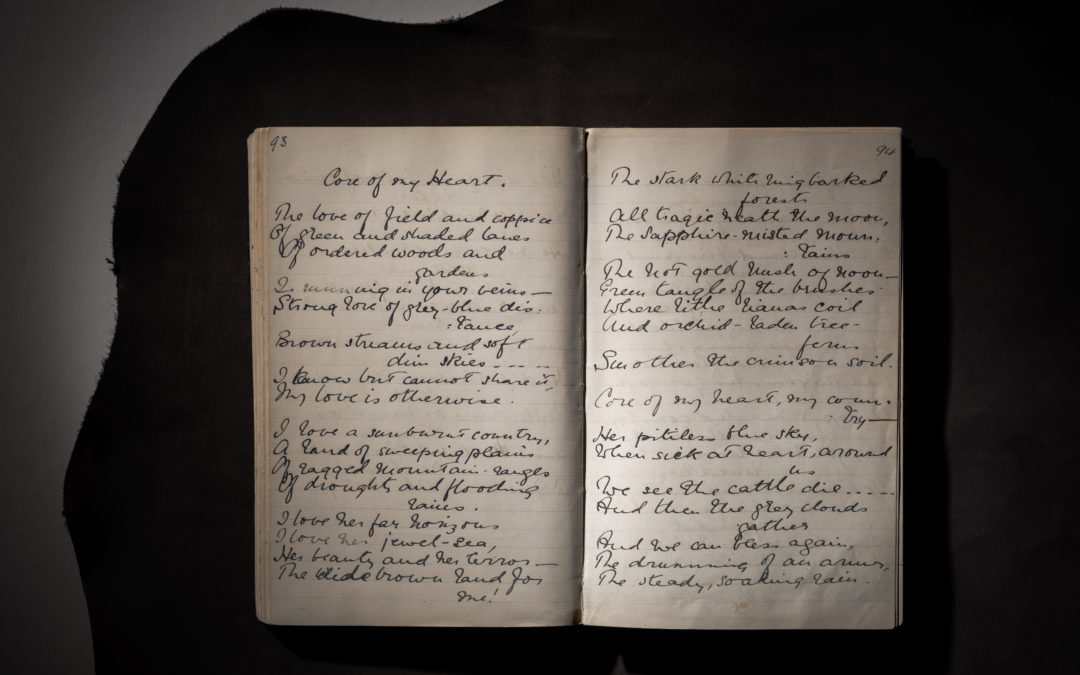
Image courtesy State Library of New South Wales
For many here, beyond the election years when we're reminded where the name of our electorate stems from a poetess's love of Australia, its bush, its wildlife, far horizons and jewelled seas, Dorothea remains the Lass of Lovett Bay - a faerie spirited lady whose songs of our area warble like a clear clean creek down the valley of and over the waters.


References - Extras
- Ann M. Mitchell, 'Mackellar, Sir Charles Kinnaird (1844–1926)', Australian Dictionary of Biography, National Centre of Biography, Australian National University, https://adb.anu.edu.au/biography/mackellar-sir-charles-kinnaird-7382/text12833, published first in hardcopy 1986
- Beverley Kingston, 'Mackellar, Isobel Marion Dorothea (1885–1968)', Australian Dictionary of Biography, National Centre of Biography, Australian National University, https://adb.anu.edu.au/biography/mackellar-isobel-marion-dorothea-7383/text12835, published first in hardcopy 1986
- TROVE - National Library of Australia
- Dorothea Mackellar at Pittwater by Keith Amos 2020
- Tarrangaua Open House At Lovett Bay - 2012 report
- Dorothea Mackellar History by Margaret Molloy OAM - 2012
- Ruth Marjory Bedford 1882–1963 by A J Guesdon - 2011
- Tallamalla-Bilgola Cottage-Bilgola House History by A J Guesdon - 2011
- Annie May Moore 4th of January, 1881– 10th of June,1931 History by A J Guesdon - 2011
- Ethel Turner's Seven Little Australians Added To UNESCO Memory Of The World Register - The Missing Pages Restored by Matthew Curlewis, 2019
- The Baird Family Of Mona Vale - The Wentworths Of Newport History page by A J Guesdon - 2021
Core of My Heart (My Country)
written in 1904 - Dorothea McKellar
IN THE LIBRARY.
CORE OF MY HEART.
In the London "Spectator," to hand by the last mail, appears the following poem by Miss Dorothea Mackellar, daughter of Dr. Mackellar, M.L.C., of Sydney:—
The love of field and coppice,
Of green and shaded lanes,
Of ordered woods and gardens,
Is running in your veins—
Strong love of grey-blue distance,
Brown streams and soft, dim skies...
I know but cannot share it,
My love is otherwise.
I love a sunburnt country,
A land of sweeping plains,
Of ragged mountain ranges,
Of droughts and flooding rains.
I love her far horizons,
I love her jewel-sea.
Her beauty and her terror—
The wide brown land for me!
The stark white ring-barked forests
All tragic 'neath the moon,
The sapphire-misted mountains,
The hot gold hush of noon—
Green tangle of the brushes
Where lithe lianas coil,
And orchids deck the tree-tops,
And ferns the crimson soil.
Core of my heart, my country—
Her pitiless blue sky,
When, sick at heart, around us
We see the cattle die...
And then the grey clouds gather,
And we can bless again
The drumming of an army,
The steady, soaking rain.
Core of my heart, my country,
Land of the Rainbow gold—
For flood and fire and famine
She pays us back threefold...
Over the thirsty paddocks
Watch, after many days,
The filmy veil of greenness
That thickens as you gaze...
An opal-hearted country,
A wilful, lavish land—
All, you who have not loved her,
You will not understand...
Though Earth holds many splendours,
Wherever I may die,
I know to what brown country
My homing thoughts will fly.
Dorothea Mackellar, in "London Spectator. "IN THE LIBRARY. (1908, October 21). The Sydney Mail and New South Wales Advertiser (NSW : 1871 - 1912), p. 1056. Retrieved , from http://nla.gov.au/nla.news-article163231368
Dorothea Mackellar began writing ‘Core of My Heart’ while living in England between 1904 and 1908, inspired by her childhood experience of life on the land in the NSW Hunter region. As a young girl, holidaying on her family’s property, Dorothea witnessed the breaking of a drought and, after the rain, watched the paddocks turn green before her eyes. Her poem is an expression of her passionate attachment to the ‘wide brown land’ over the ‘green and shady lanes’ of England.
THE JUDGES.
Those people we have come upon
Who eat the shells and leave the kernels,
Exclusively relying on
Externals.
Those people who from early youth
Find naught beyond nor yet above them,
I cannot say with any truth
I love them.
Their thoughts are guileless as their acts,
They don't know where the shoe is pinching,
But judge you on the 'patent facts'
(Like lynching).
'Wrong's wrong, and right is right, you see,'
Say they who've looked behind the curtain;
It must be very nice to be
So certain.
They, as their lives flow calmly on,
Forget (or never know) temptation,
So deal unhesitating con-
Demnation.
To those, who in the road below—
Choked with the acrid dust that's flying,
Hard-driven, blind—can only know
They're trying.
The self-made judges, confident,
When they have hurt you tilting blindly;
Try to remember that they meant
It kindly.
There are all ages in that host,
But (as an optimist who's truthful)
I cheerfully admit that most
Are youthful.
They surely will grow up some day,
And when they make a common blunder
(The sort we make), what will they say,
I wonder?
I think they'll plead they're weak and young
Poor babes, who make the usual smudges;
God help them if they fall among
The Judges!
Dorothea Mackellar. WOMAN'S VIEW. (1908, October 10). Herald (Adelaide, SA : 1899 - 1910), p. 15. Retrieved from http://nla.gov.au/nla.news-article110187138
The Open Sea.
(For the "Sunday Times"— By Dorothea Mackellar.)
From my window I can see
Where the sandhills dip,
One far glimpse of open sea :
Just a slender slip,
Curving like a crescent moon,
Yet a greater prize,
Than the harbor, garden-fair,
Spread beneath my eyes.
Just before me swings the bay. .
Sings a sunny tune,
But my eyes are far away,
Far beyond the dune.
Clearer is the sea-gull's cry
And the breakers' roar,
Then the little waves, so-near,
Lapping on the shore.
For that strip of dark-blue sea,
Set against the sky,
Far horizons means to me :
And the ships go by
Framed between the empty sky
And the yellow sands,
While my freed thoughts follow them
Out to other lands.
When the livid waters flee,
Flinching from the storm,
From my window I can see,
Standing safe and warm,
How the white foam tosses high
On the naked shore.
And the breakers' thunder grows
To a battle-roar.
One small strip of open sea —
Is it little worth ?
None knows how it gives to me
Keys of all the earth.
The Open Sea. (1909, December 19). Sunday Times (Sydney, NSW : 1895 - 1930), p. 9 (The Sunday Times Christmas Number). Retrieved from http://nla.gov.au/nla.news-article126584320
AUSTRALIAN AUTUMN
This is the gentlest season of the year.
From mists of pearl and gold
The slow, sweet hours unfold,
To crystal colours, still
As glass, but not as chill.
All birds speak softly in the autumn bush.
One bellbird from the deep
Like a call heard in sleep
Chimes: in the bronze-gold gloom
Cool greenhood orchids bloom.
Brown leaves are withering on the alien trees.
The metal of our hills
Is veiled with blue that fills
The spirit with a bright
Sense of intrinsic light.
Now that the dew has vanished, sheep lie down
By companies content
In wilga-shade and scent;
The reaper sounds nearby
Like the cicadas' cry.
And so the mellow day flows on to dusk,
And loveliness that grows
With skies of mauve and rose;
While fragrant smoke-plumes lie
Subtle as memory.
Curled round our hearts in this still jewelled air,
Risen from the pulsing fire
Many-hued like desire.
Overhead stars blaze white.
Superb in frosty night.
This is the kindliest season of the year.
The sun's gold arrows all
Have lost their barbs; thick fall
The berries ripe, and still
Each bird may have his fill.
Now peace and plenteousness have spread their wings
After the blessed rains
On autumn hills and plains.
We too give thanks and bless
This southland's graciousness
DOROTHEA MACKELLAR.
AUSTRALIAN AUTUMN. (1924, June 7). The Sydney Morning Herald (NSW : 1842 - 1954), , p. 13. Retrieved from http://nla.gov.au/nla.news-article28073488 and POEMS & RHYMES. (1928, April 14). The Register (Adelaide, SA : 1901 - 1929), , p. 4. Retrieved from http://nla.gov.au/nla.news-article57041048
A RHYME OF GUM TREES. 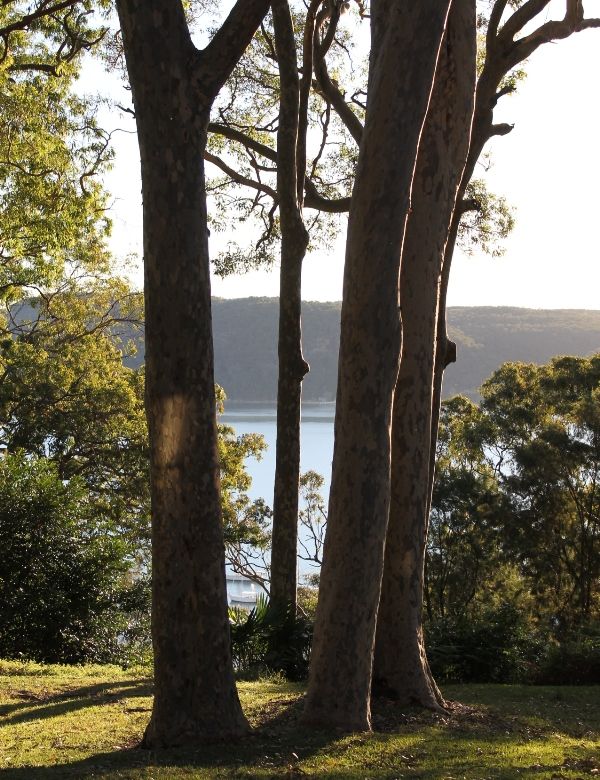 Bronze-green, bronze-gold, the eucalypts
Bronze-green, bronze-gold, the eucalypts
stretch out to the horizon,
The reticent tall children of a frank and
subtle land.
The hundred-named, the million-formed
"monotonous" men call them,
The gum trees that some artists and all lovers
understand.
For Corot's ghost is often here, and living
men come also,
To paint them In the sunbeams' shower; no
trees so glance with light;
Or ranged upon hillside like the-columns of a
temple,
Or tossing wild funereal plumes against the
coming night.
The gum trees sleep so lightly that the faint-
est breeze will wake them,
For I have seen them etched In black on
skies of apple-green,
Till feather-soft the dawn wind ran among
their carven branches,
The sun uprose; and feather-light they danced
in golden sheen.
They never wore like other trees, and all
their subtle changes
Of flower and leaf, and all their moods of
gaiety or pride
Or cynical reserve, will go unknown save to
their lovers,
But It will not fret the gum trees It their
beauty Is decried.
Sharp wafts of scent are blown to me; from
here to the horizon.
The secret forest roaches out, as restless as
the sea,
With foam of blossom here and there; and
every tree within It
Is pungent with the savour of Its own Identity.
DOROTHEA MACKELLAR.
A RHYME OF GUM TREES. (1925, March 21). The Sydney Morning Herald (NSW : 1842 - 1954), p. 13. Retrieved from http://nla.gov.au/nla.news-article16197033
DOROTHEA MACKELLAR
"Fancy Dress" and Other Verse, by Dorothea Mackellar published - by Angus and Robertson, Sydney.
The name of Dorothea Mackellar is known throughout Australia as that of a sweet singer in verse. She Is one of the foremost of the several women who have translated their deep love for Australian nature into literary gems of rare polish and appeal, and those who take delight In approaching the great outdoor life through the fancy of a poet will welcome this new volume of verse by Miss Mac-kellar. The book is divided into two sections: 'Times and Seasons' and "Fancy Dress."
In the first the author revels in the beauty of Nature with the joy that seems always to increase; in the second she is more philosophic, a little more worldly, and perhaps more Individual. Miss Mackellar never seems to want for a happy word when she is picturing either a real or imaginary scene, and her handling of metre is unfailingly adequate. How satisfying she is in the freshness of her imagination may be gauged from a single stanza taken from the poem,
"Winter in the Garden": —
'Green Iily buds blanch now to milk;
The Iceland poppy thrills with sap,
Shakes off her little furry cap.
Shakes out her skirt of pleated silk."
Rain on the mountains has inspired innumerable poets, but when Miss Mackellar writes "Rain Music" there is new delight to be found: —
"As I climbed the mountain, rain was blowing cold.
Grey the sky and mournful,
the Silver Falls were gold,
Every bird was silent,
yet a chorus rang
Wailing down the gullies, roaring In the trees.
Till it seemed full-throated that the mountain sang—
Cried the organ voices, of the wind, and under these
Strains of other music: raindrops lisping chill;
Rivulets that chuckled racing at their will,
Wee frogs tinting treble; big ones chanting bass,
Wheresoever boulders made a sheltered place;
Hoarse sweet hollow voices of the arching fall,
Amber-tawny waters leaping musical.
There is a highly successful blend of humour and fancy in "Miss Merritt," vigorous picturesqueness in "The Moving Mountain," and a tender charm in "Babylon" to mention but three of the many pleasing poems which follow "Fancy Dress," And there is definite solace in the suggestion of "Luck";
"I wasn't born (said the Seventh Son)
Sucking a silver spoon,
But I saw black swans the other night
Flying across the moon,
At dusk, on a rising moon.
I haven't been lucky In love (he said),
Nor picked up a sixpence yet,
But I found the place where seagulls sleep
After the sun is set:
White drifts when the sun is set.
"Though I've missed some concerts and comedies
And balls In the usual way,
I've come on a mother platypus,
With her babies out at play,
Velvety twins at play,
"I wasn't born, (said the Seventh Son)
With a silver spoon to suck,
Nor bowled to church in a limousine,
But my christening brought, me luck.
There are several sorts of luck." DOROTHEA MACKELLAR (1927, January 15). The Telegraph (Brisbane, Qld. : 1872 - 1947), p. 11. Retrieved from http://nla.gov.au/nla.news-article180610449
Poetess and Novelist Dorothea Mackellar
MISS DOROTHEA MACKELLAR' S lovely old home, "Rosemont," at Woollahra, is approached through a long and shady drive of overhanging trees, bordered at the lower sides with a thick undergrowth of fern. "A lifting entrance to the home of a poetess, surely, ' thought the pedestrian, scattering the brown gravel with impatient footsteps; and even more so when, a few minutes later, a wide vista of garden and lawn, flanked on one side by a tennis court and several summer-houses, came into view. A rambling old house, with wide stone verandahs, furnished Invitingly with hammocks and lounges, served to intensify the first impression that here was quietness and pence — a setting so remotely restful that one realised with a start of surprise it was only a short distance from the humdrum and noise of the city.
In Miss Mackellar's study was not only the poetess, but Dan. Dan is a cocker spaniel, and makes himself as much at home as any of the other inmates of the house. And Dan is not alone in this, either. He has two other canine companions — John and James. John is also a cocker spaniel, and James an Aberdeen terrier. Their existence, were the luxury of it known, would be the envy of many other dogs; but happily fate has decreed that they remain In ignorance. Miss Mackellar loves them. She has photographs of them in various stages of youth and maturity since they were tiny puppies, enough almost to fill an album.
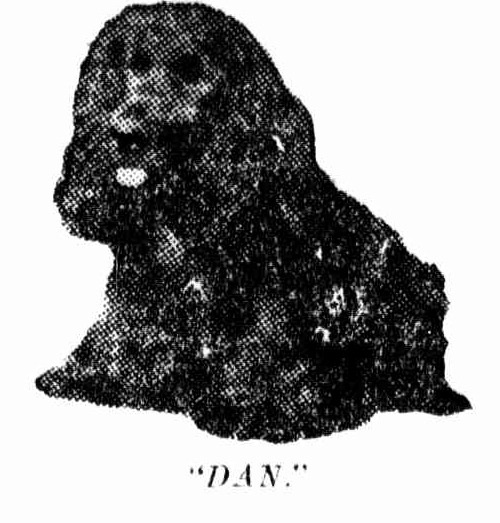
"DAN."
She is busy just at present packing, for she intends leaving for England by the Cathay on March 22. Lady Mackellar is going' with her, and they will be away for twelve months, or maybe longer. They are to remain in England until the Autumn, and then go south to Italy. As an Australian poetess Dorothea Mackellar is well known. Her verse is widely published, and is memorised and quoted in part by many lovers of the aesthetic. She commenced to publish at the early age of seventeen, and inspiration, with her, seems to have no ending. Not content with writing "mere" verse, she has. to her credit, written several novels. "Outlaw's Luck" is entirely her own composition, but two others — "Two's Company" and "The Little Blue Devil" — were written in collaboration with Ruth Bedford, a girl friend.
She finds now that family concerns take up much of her time, and is content, with the exception of odd verse publications, to leave writing for the time being in the background. England, Europe, Canada, Japan, Java, and other parts of the East are merely names to many of us, but not to Miss Mackellar. She has visited them all. In Australia also her time has not all been confined to the city. As a lover of Nature the country naturally appeals to her, and she has spent many months at odd times on stations in New South Wales and Queensland. She owns a small cottage at Broken Bay, where, when time permits, she enjoys a holiday.
Miss Mackellar is very interested in the work of the Bush Book Club. As head of the selection committee for reading matter for outback districts she has some extremely busy times, for the matter of selection and of reviewing the thousand) of books sent in is no small task, even for a committee of philanthropists. In amateur acting she is also interested, and has been associated with the Repertory Society for years, and is a member of the advisory committee of the Playbox Theatre. At one time she did a lot of acting herself.
While abroad Miss Mackellar hopes to be able to attend the P.E.N. Club Conference in Brussels in June, to which she has been invited by Mrs. C. A. Dawson Scott, the founder and well-known novelist, and of which she is also a member. The club is a cele-purely social. The membership is confined strictly to the lettered elite — publishers, editors, and novelists. P.E.N. What could be more apt? Miss Mackellar has hopes of establishing a branch here when she returns from abroad.
.jpg?timestamp=1652395662977)
MISS DOROTHY MACKELLAR.
Poetess and Novelist Dorothea Mackellar (1927, March 10). The Daily Telegraph (Sydney, NSW : 1883 - 1930), p. 5 (The Daily Telegraph Woman's Supplement). Retrieved from http://nla.gov.au/nla.news-article245876867
William Hardy Wilson was an Australian architect, artist and author. Determined to make Australians as aware of their early colonial heritage, Wilson made drawings of colonial buildings in New South Wales and Tasmania: he 'looked at buildings with a painter's eye as much as an architect's', even noting the plants in their gardens. In 1924, his 'Old Colonial Architecture in New South Wales and Tasmania' was published containing 50 collotypes of his drawings.
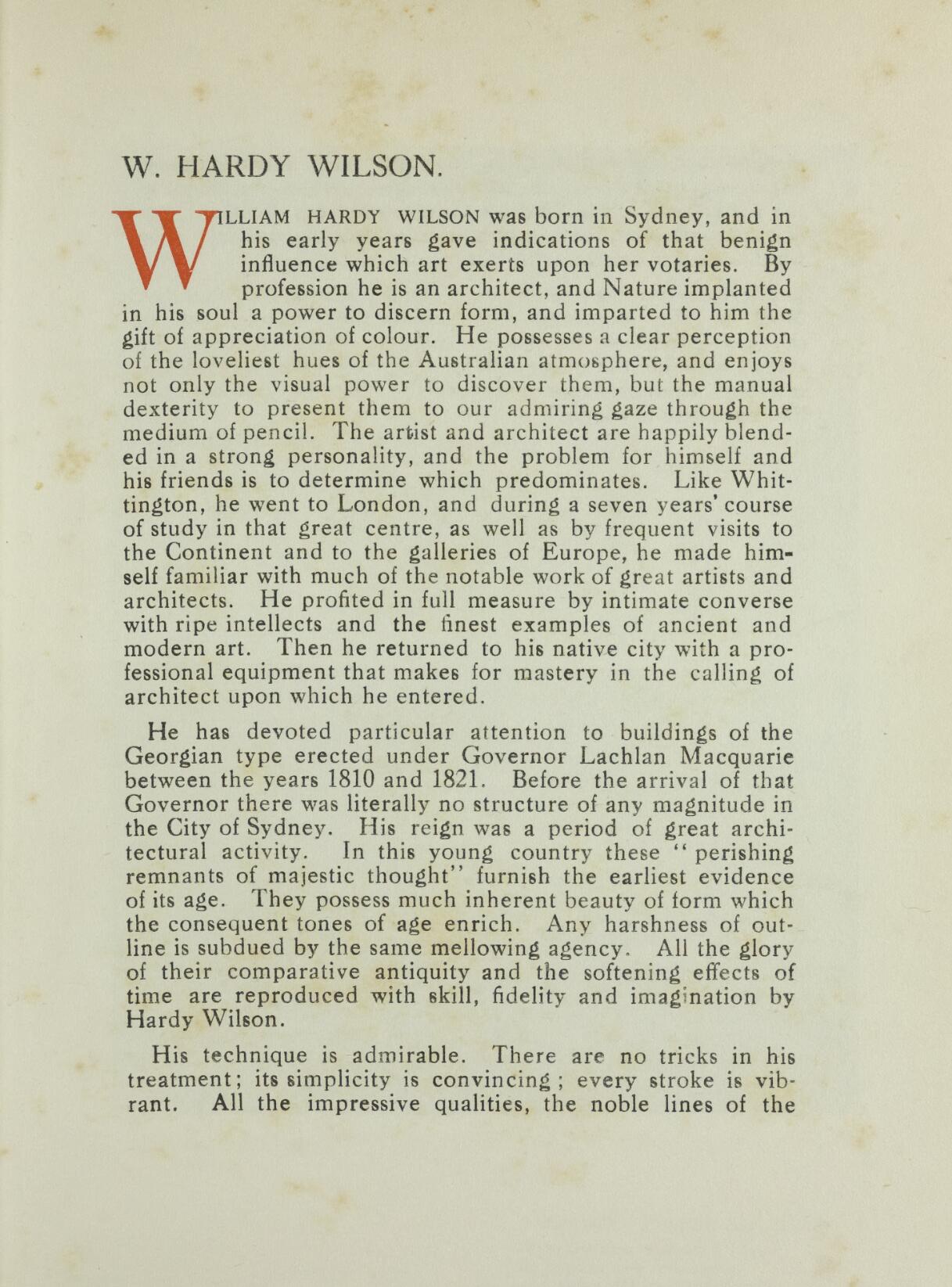
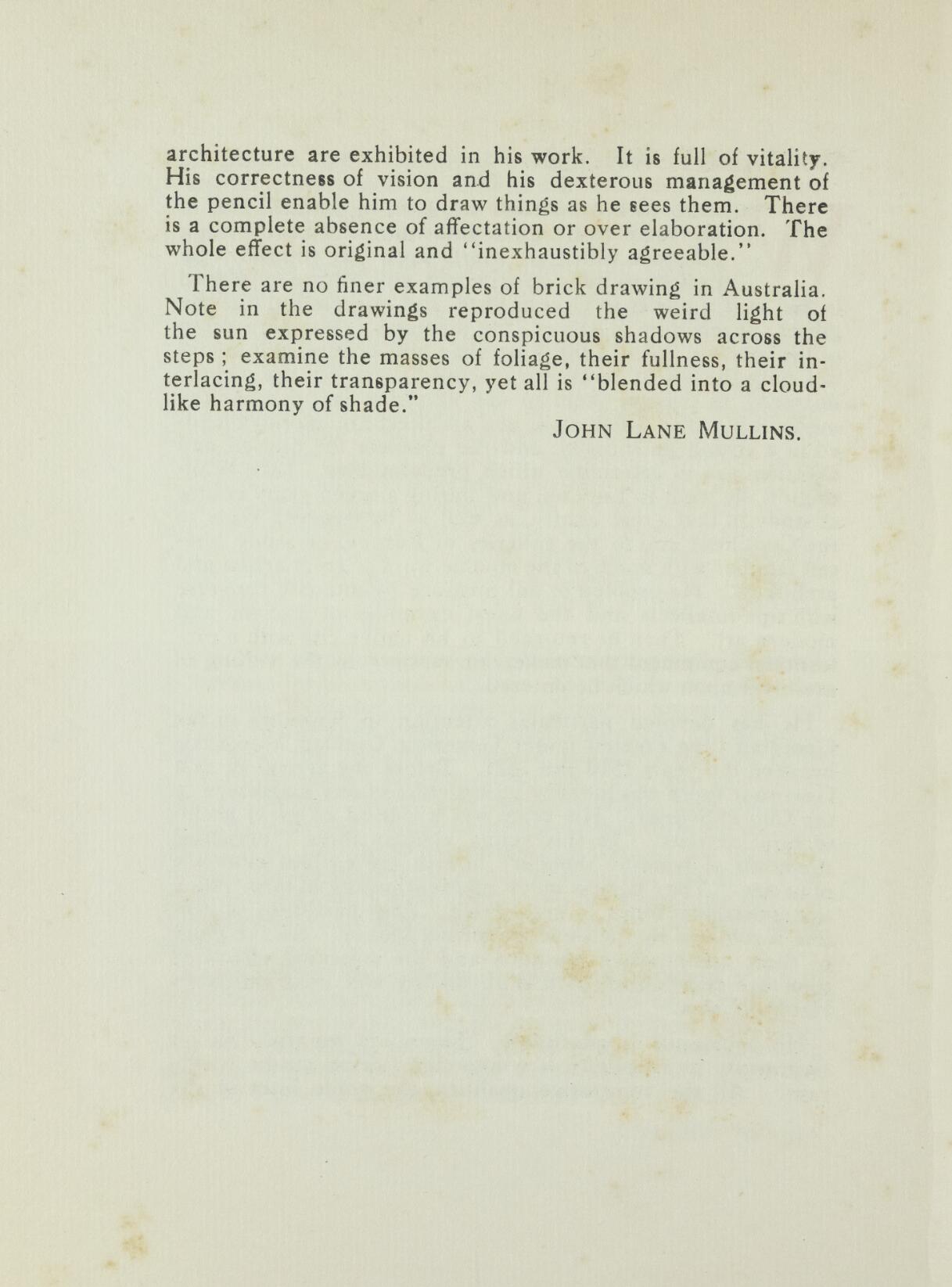
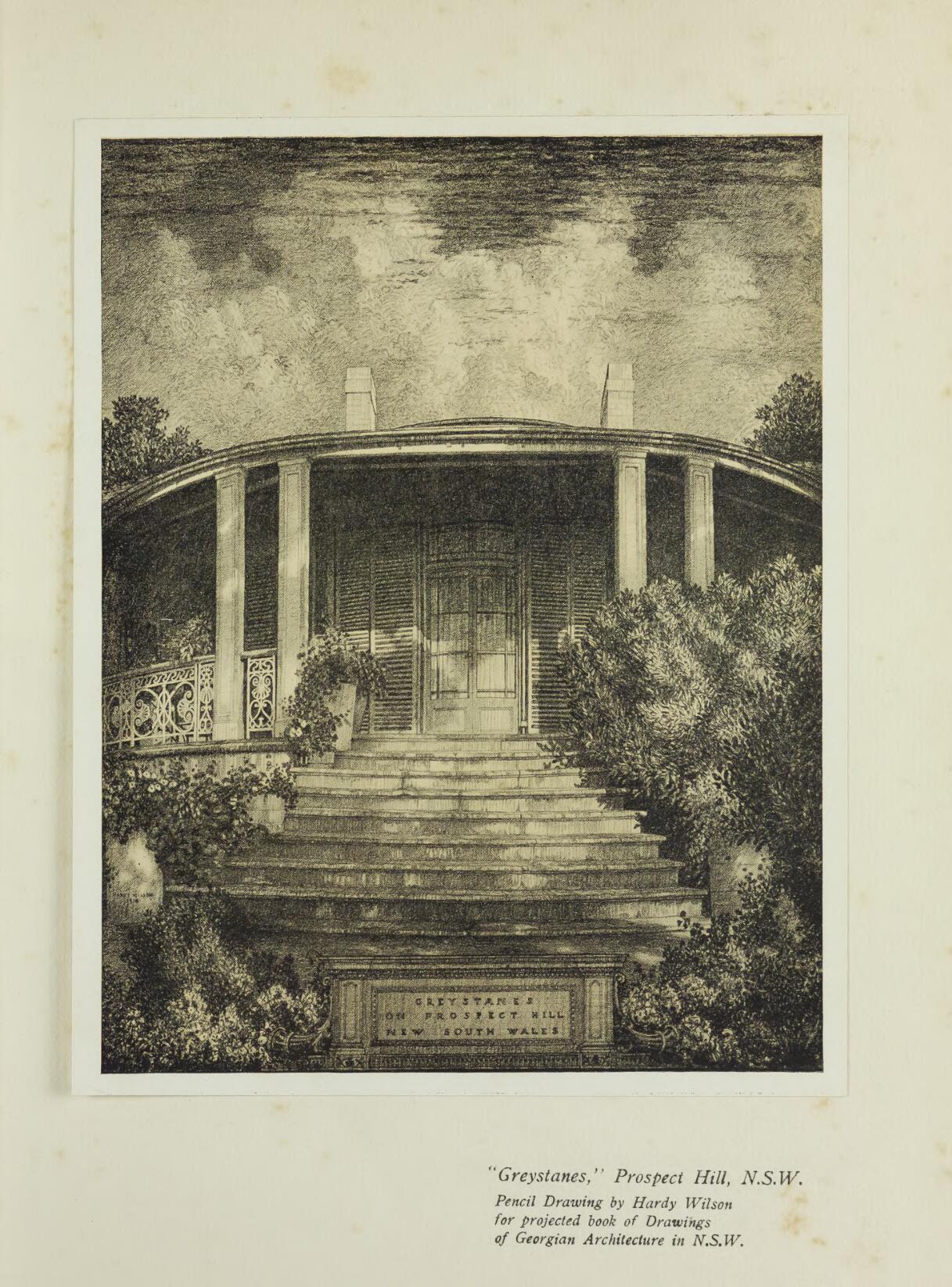
(1916). Art in Australia - edition; Art in Australia. No. 2 (1917) Retrieved from http://nla.gov.au/nla.obj-351943548
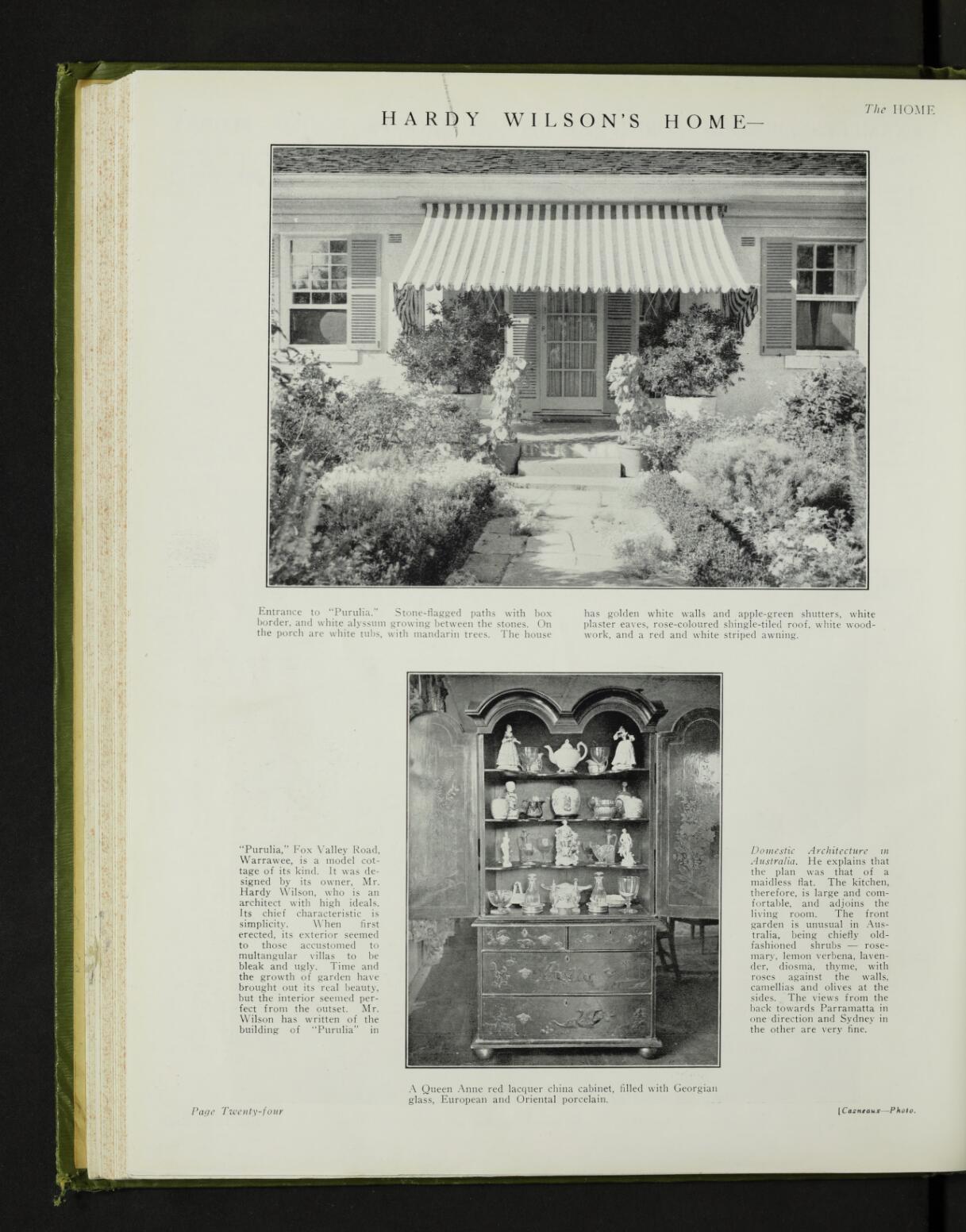
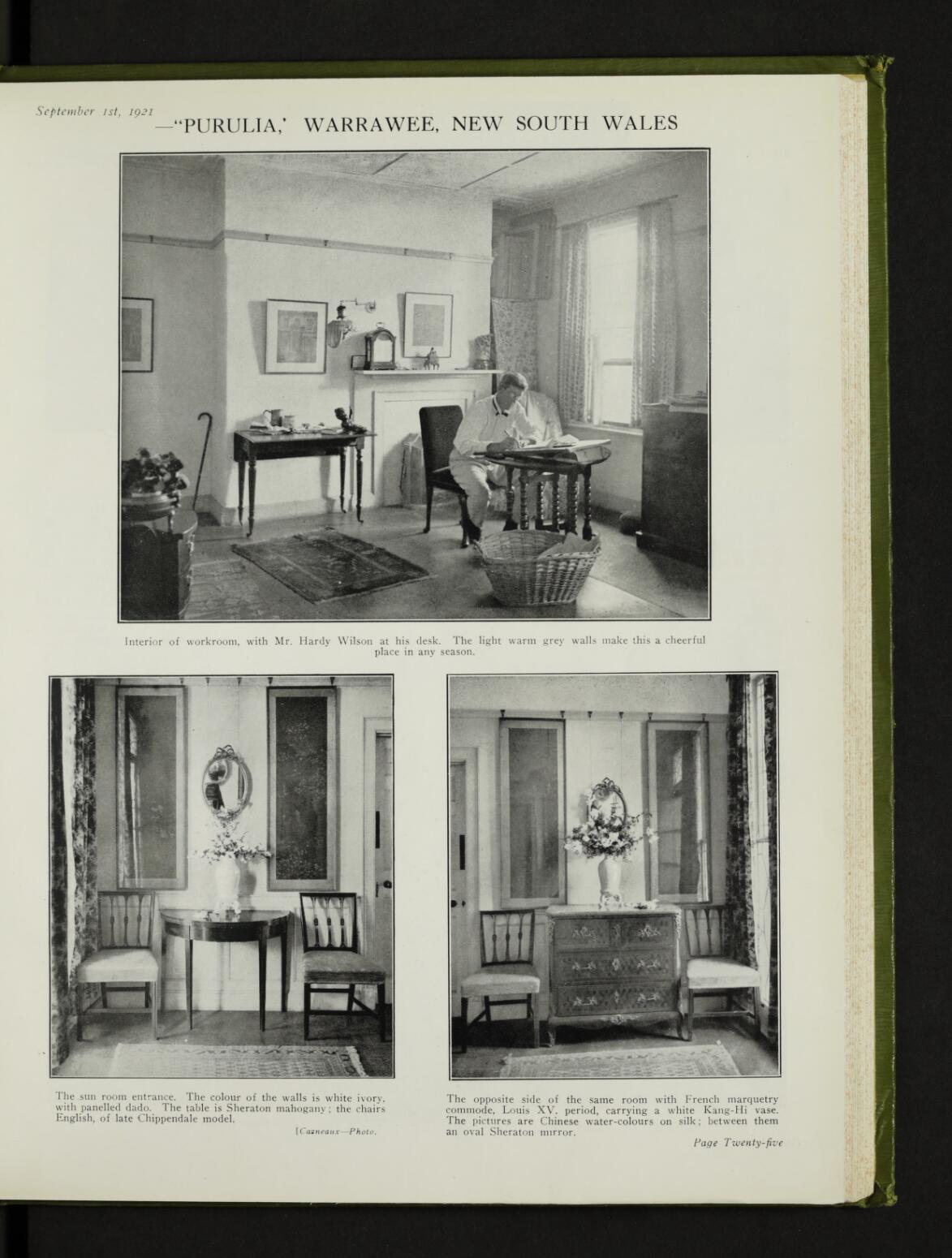
(1920). The Home : an Australian quarterly Edition: Vol. 2 No. 3 (1 September 1921)Retrieved from http://nla.gov.au/nla.obj-375385990

